-
BlackRock halted Ukraine recovery fund following Trump victory, France working on replacement, Bloomberg reports
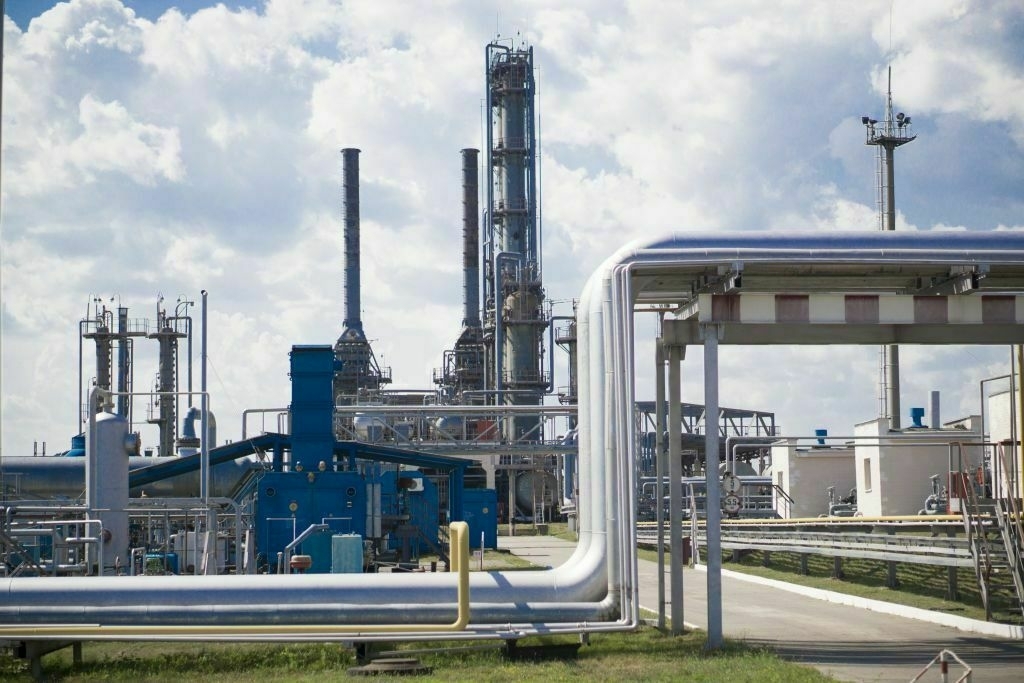
BlackRock, a U.S. investment firm, suspended work on a multibillion-dollar Ukraine recovery fund following U.S. President Donald Trump’s election victory, prompting France to work on a replacement, Bloomberg reported on July 5.
The plan nearly secured the initial support of institutions backed by the governments of Germany, Italy, and Poland, people familiar with the matter told Bloomberg.
Kyiv has sought to secure investment in Ukraine’s reconstruction as Russia’s war continues to destroy infrastructure across the country.
BlackRock halted its search for institutional investors in January, causing the planned funding that sought to secure $500 million from governments, development grants, and investment banks, and another $2 billion from private investors, to fall through.
The investment firm halted talks with institutional investors in January due to a lack of interest amid perceived uncertainty in Ukraine.
The fund was set to be unveiled by BlackRock at the upcoming Ukraine Recovery Conference on July 10-11 in Rome, Bloomberg reported.
A spokesperson for BlackRock said the investment firm completed advisory work for the recovery fund pro bono in 2024 and no longer has “any active mandate."
France is working on a proposal to replace the recovery fund led by BlackRock, people familiar with the matter told Bloomberg, adding that it remains uncertain how effective the plan will be without Washington’s backing.
President Volodymyr Zelensky and Italian Prime Minister Giorgia Meloni are expected to attend the Ukraine Recovery Conference next week.
Despite a partial rebound from a 30% economic slump in 2022, foreign investment in Ukraine remains underwhelming.
As US aid to Ukraine dries up, new platform connects Americans investors with Ukrainian startupsUkraine’s startup ecosystem has tripled in five years, even during Russia’s full-scale invasion, to become the second most valuable in Central and Eastern Europe at $28 billion.The Kyiv IndependentDominic Culverwell
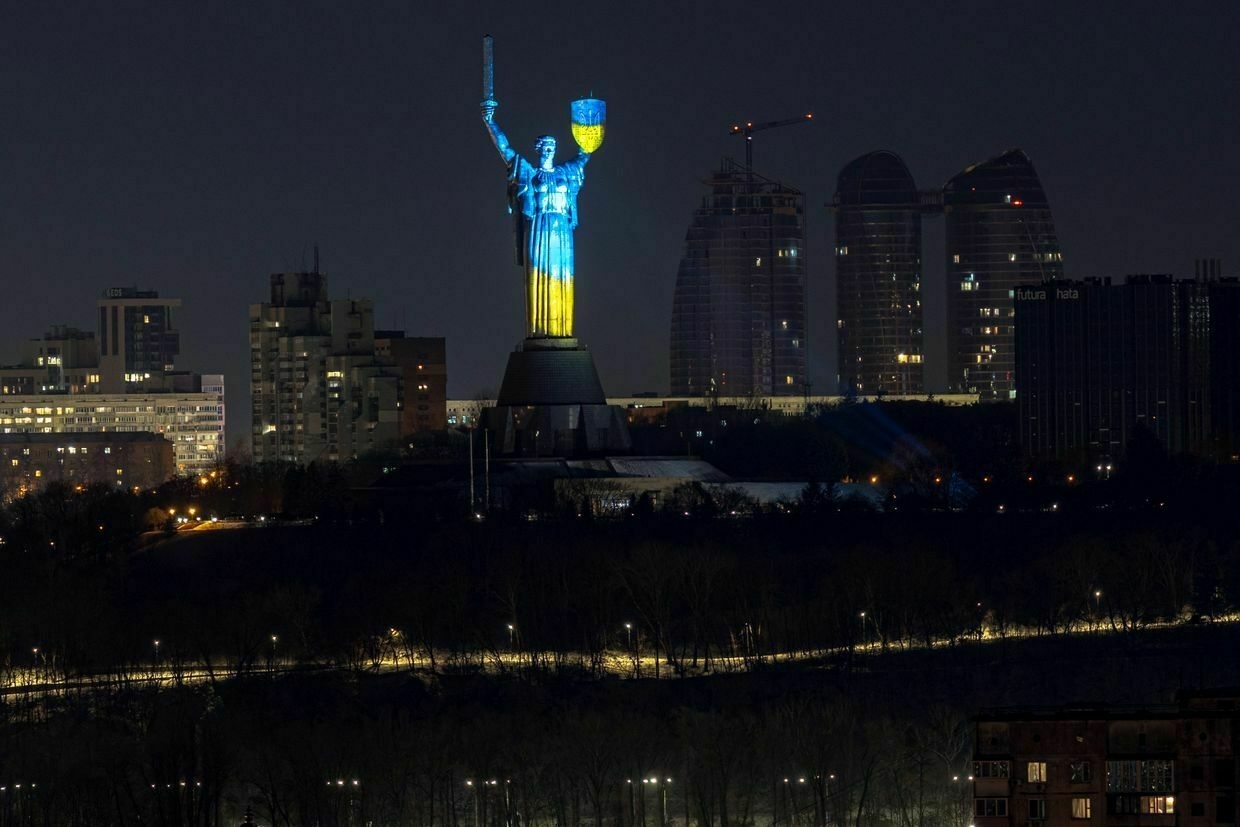
-
4 killed, 37 injured in Russian attacks on Ukraine over past day
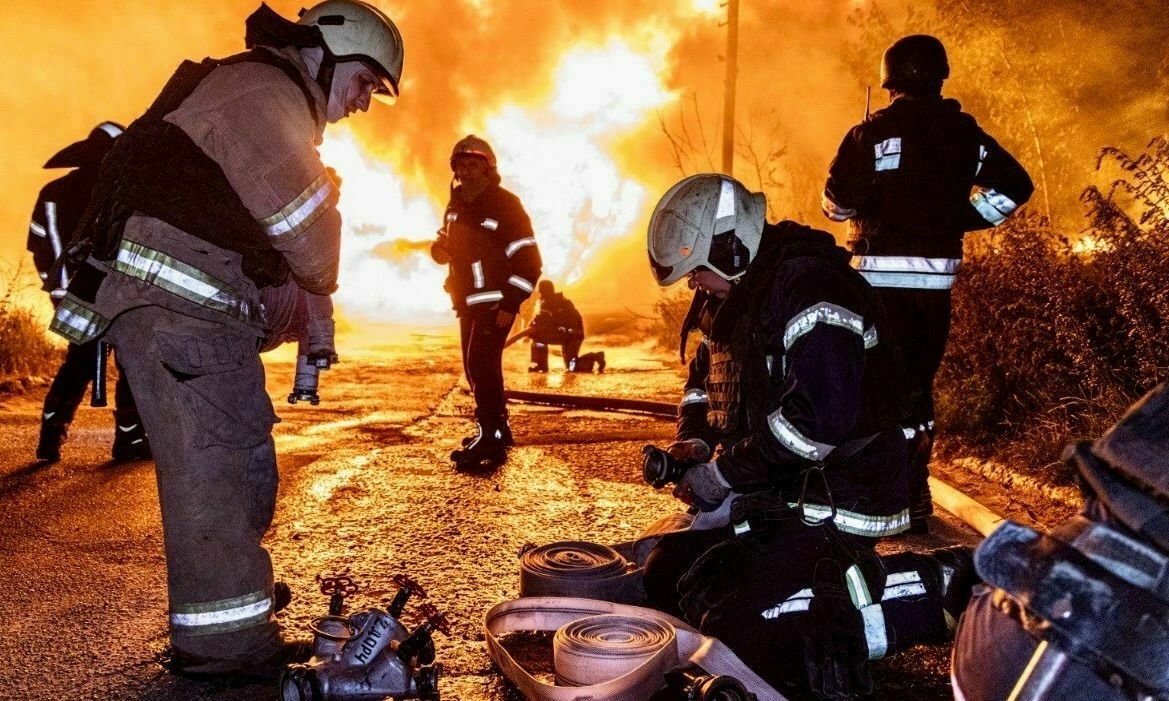
At least four civilians were killed and 37 others injured in Russian attacks across Ukraine over the past 24 hours, regional authorities reported on July 5.
Russia launched 322 drones overnight, including Iranian-designed Shahed-type attack drones, according to Ukraine’s Air Force. Air defenses intercepted 292 drones, while another 135 dropped off radars, likely used as decoys to overwhelm Ukrainian systems.
The attack was repelled using aviation, electronic warfare, mobile fire teams, and air defense systems.
In Donetsk Oblast, Russian strikes killed two civilians and injured four more, Governor Vadym Filashkin said. In Kharkiv Oblast, one person was killed and 15 injured, including two children, according to Governor Oleh Syniehubov.
In Kherson Oblast, 11 civilians were injured as Russian forces targeted residential areas and other civilian infrastructure, Governor Oleksandr Prokudin reported.
A 49-year-old postal worker was injured in Chernihiv Oblast by a first-person-view (FPV) drone, Governor Viacheslav Chaus said. The man sustained shrapnel wounds while delivering mail.
In Dnipropetrovsk Oblast, four civilians, two men and two women, were injured in Russian strikes, Governor Serhii Lysak reported.
In Zaporizhzhia Oblast, an 84-year-old man was killed, and two others — a 54-year-old man and a 10-year-old boy — were injured, Governor Ivan Fedorov said.
The latest strikes come as Russia continues to escalate its aerial campaign and reject calls for a ceasefire. Ukrainian officials have repeatedly urged Western partners to bolster Ukraine’s air defense capabilities amid persistent drone and missile strikes.
Trump says Putin ‘wants to keep killing people,’ signals US may send Patriots to Ukraine“It just seems like he wants to go all the way and just keep killing people. It’s not good,” U.S. President Donald Trump said. The Kyiv IndependentTim Zadorozhnyy
The Kyiv IndependentTim Zadorozhnyy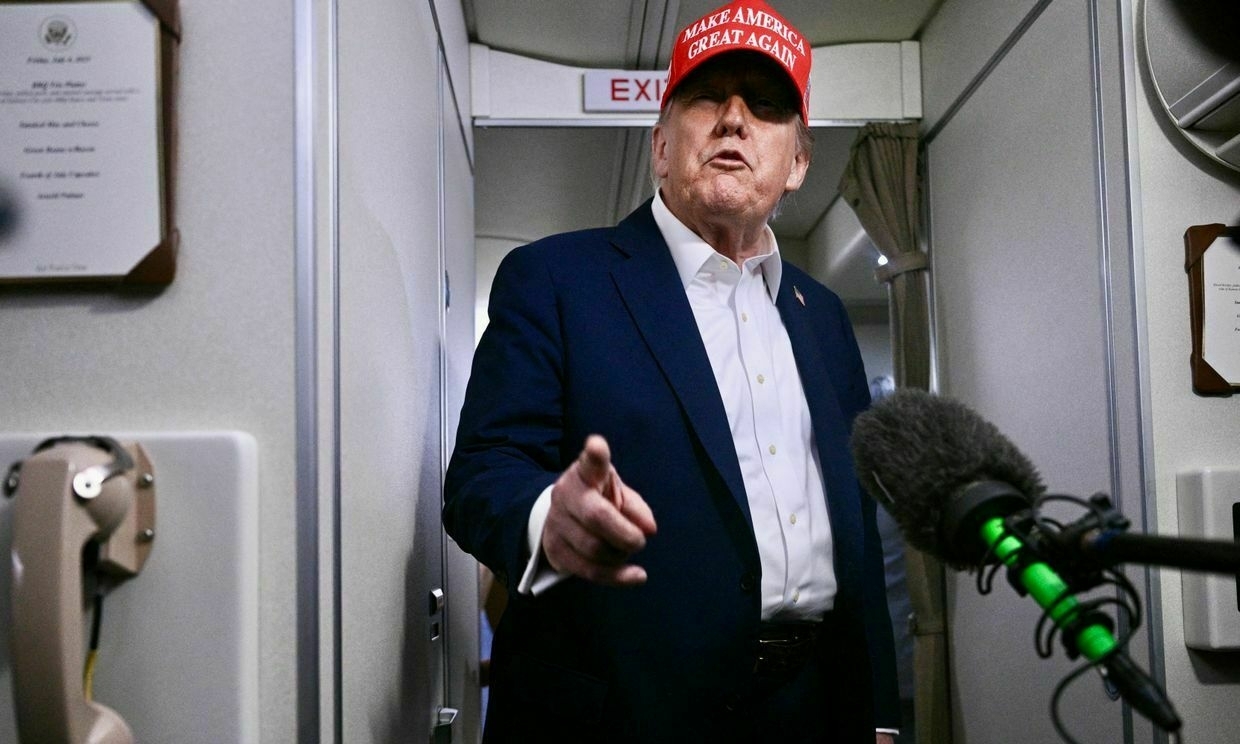
-
Trump says Putin 'wants to keep killing people,' signals US may send Patriots to Ukraine
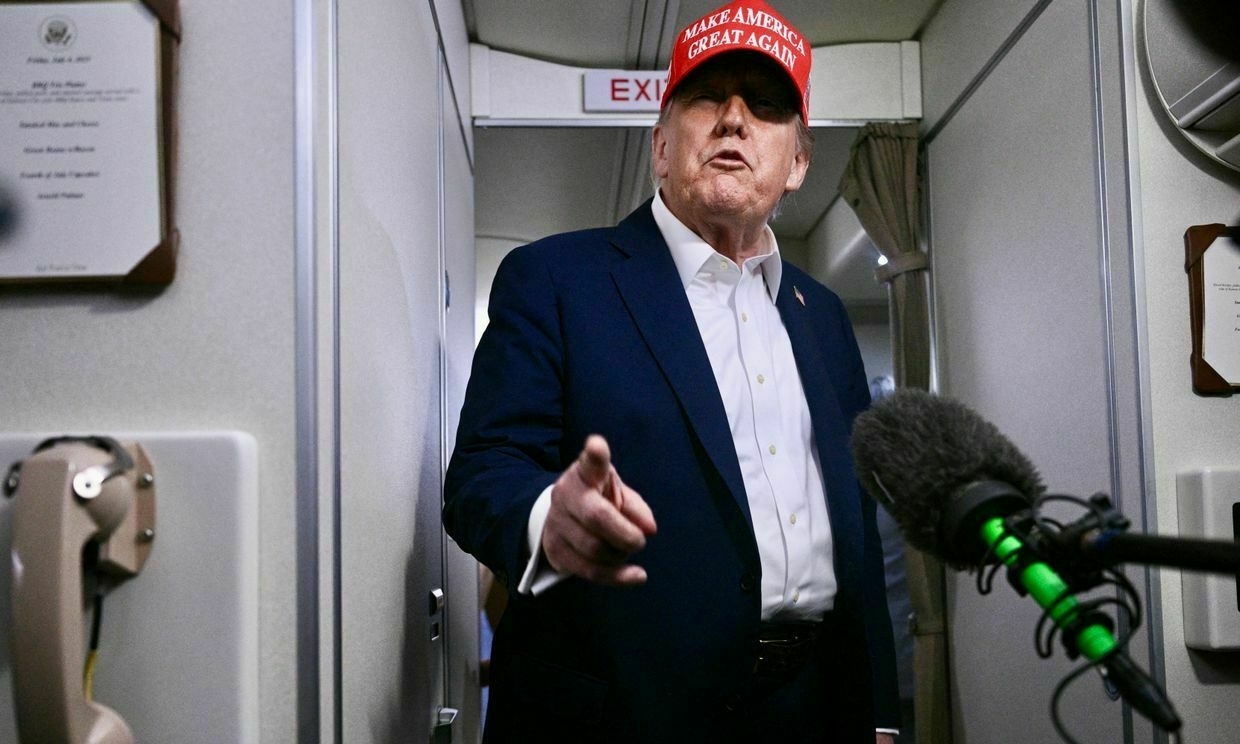
U.S. President Donald Trump said on July 5 that Russian President Vladimir Putin does not appear interested in ending the war in Ukraine, according to a comment made onboard Air Force One.
Trump reiterated that he was “very unhappy” with the July 3 phone call between the two leaders.
“It just seems like he wants to go all the way and just keep killing people. It’s not good. I wasn’t happy with it,” Trump told reporters.
The call, which lasted about an hour, was confirmed by the Kremlin to have focused on Ukraine. Putin reportedly told Trump that Russia would continue pursuing its “goals” in the war.
Trump’s remarks follow a sharp escalation in Russian missile and drone attacks across Ukraine that have killed and injured hundreds of civilians in recent weeks.
The strikes have hit multiple regions, destroying civilian infrastructure amid persistent calls from Ukraine, the U.S., and Europe for an unconditional ceasefire.
The day after his call with Putin, the U.S. president spoke by phone with President Volodymyr Zelensky and said the two had a “very strategic” conversation.
“We talked about different things… I think it was a very, very strategic call,” Trump said. When asked about supplying Patriot air defense systems to Ukraine, he replied, “Yeah, we might."
“They’re going to need something because they’re being hit pretty hard,” Trump added.
The statement comes as the U.S. Defense Department has paused deliveries of several key weapons systems, including Patriot missiles and precision-guided munitions, prompting concern in Kyiv.
While Trump has said he wants to help Ukraine, his administration has not imposed new sanctions on Russia since taking office and has not approved additional aid packages.
The U.S. president has instead directed strikes against Iran, targeting three nuclear facilities in June in response to regional escalations, a move critics say contrasts with his cautious approach toward Moscow.
When asked why he appears tougher on Tehran than Moscow, Trump told reporters, “No, I think I’m tougher on Russia than I am on Iran."
Despite two rounds of face-to-face talks between Moscow and Kyiv in May and June in Istanbul, no agreement on a ceasefire has been reached. The negotiations have only resulted in prisoner exchanges, as Moscow continues to push for maximalist demands in peace talks.
-
NATO chief urges US 'flexibility' on Ukraine aid as Washington halts deliveries
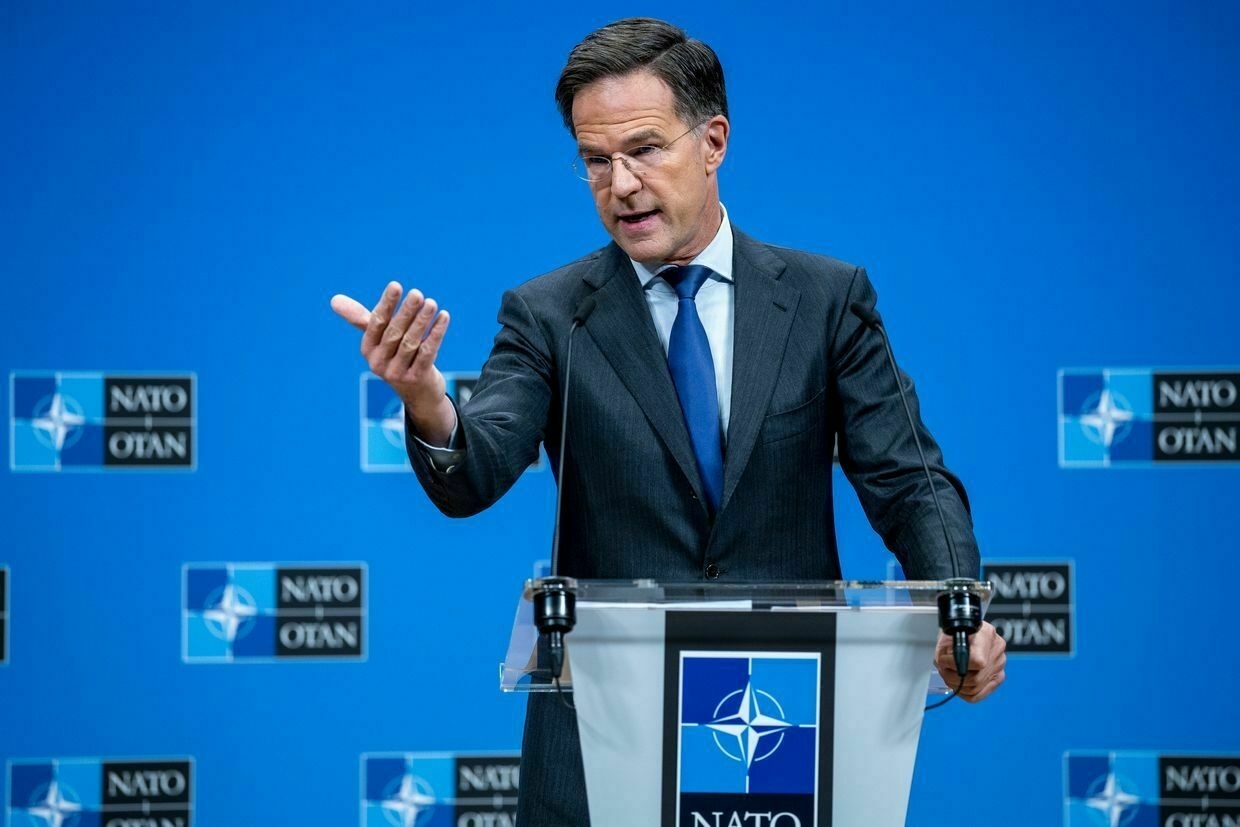
NATO Secretary General Mark Rutte on July 4 called on the United States to show “flexibility” in its military aid to Ukraine, after Washington unexpectedly paused some weapon deliveries citing concerns over dwindling domestic stockpiles.
The Pentagon’s decision to halt transfers of artillery rounds and air defense systems coincides with a significant escalation in Russian attacks on Ukrainian cities, exposing critical vulnerabilities in Ukraine’s air defense capabilities as current US funding nears expiration this summer.
“The US has to make sure that the stockpiles are at the level we need for the U.S. to have, because they are crucial for our collective defense,” Rutte told reporters on July 4. “At the same time, of course, we hope for the flexibility, we have to make sure also that Ukraine can move forward."
The Pentagon announced the aid pause this week, citing a review of U.S. stockpiles as it assesses the need to conserve weapons for other potential security threats. This move comes as Russia intensified its air campaign, unleashing record drone and missile strikes on Kyiv and other major urban centers overnight.
President Volodymyr Zelensky spoke with U.S. President Donald Trump by phone Friday, aiming to persuade the U.S. leader to resume deliveries and increase weapon sales to the country. Trump expressed disappointment following his latest conversation with Russian counterpart Vladimir Putin, which produced no progress toward a ceasefire in Russia’s war against Ukraine, now in its fourth-year.
Given Russia’s apparent unwillingness to pursue a ceasefire, allies must “be sure” Ukraine “has what it needs to stay in the fight,” Rutte emphasized. He spoke after a ceremony welcoming Air Force General Alexus Grynkewich, the new commander of U.S. military forces in Europe and top NATO military commander.
Grynkewich acknowledged the ongoing discussions, adding: “We’ll see more play out of the next week or two.” He also announced a 90-day review of U.S. forces in Europe, examining potential future US posture in the region.
A broader US military review is expected later this summer, potentially outlining significant reductions in Europe. This prospect has already raised concerns among European NATO allies, who say they have received no prior information about these plans.
Death of top Russian oil executive fuels fresh scrutiny of elite’s ‘window falls’The unexplained death of a top Russian oil executive on July 4 is fueling renewed scrutiny over the rising number of high-profile Russian officials and businessmen who have died under mysterious circumstances, specifically, have fallen out of windows. Andrei Badalov, vice president of Transneft, Russia’s largest state-controlled pipeline transport company,The Kyiv IndependentTim Zadorozhnyy
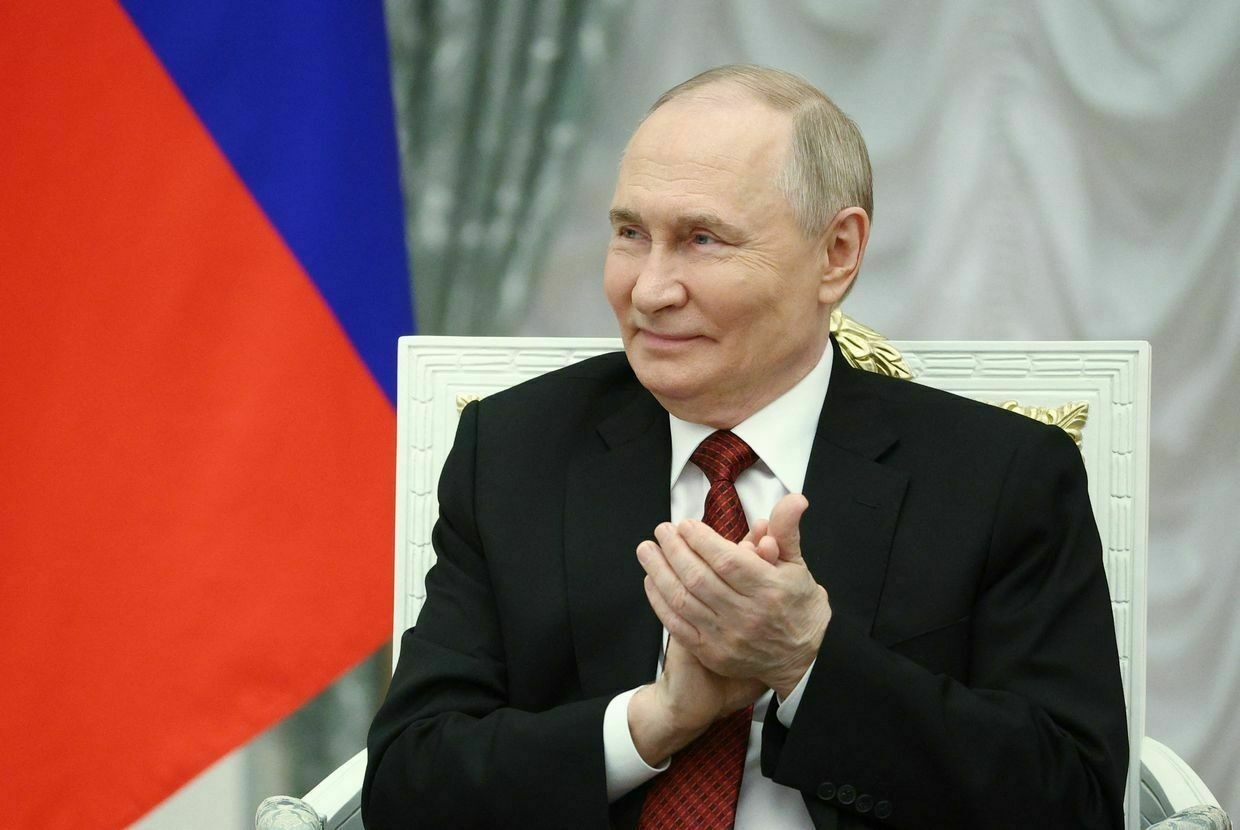
-
US did not halt weapons shipments to Ukraine, Meloni says
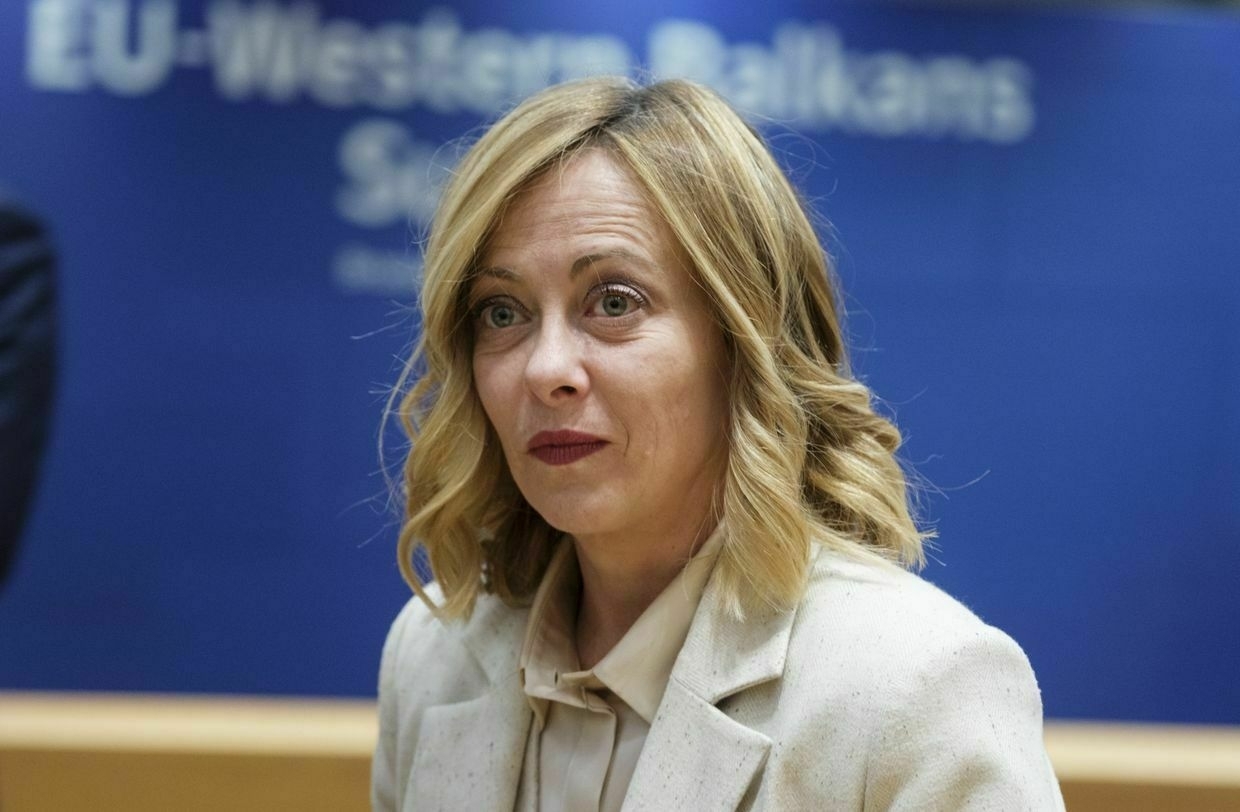
The U.S. has “reviewed” the components it is supplying Ukraine, but did not halt assistance, Italian Prime Minister Giorgia Meloni said on July 4.
“The United States has not stopped supplying weapons and supporting Ukraine, it has reviewed the decision to supply specific components… (this is) significant but very different from the total American disengagement that has been reported,” Meloni said, speaking at a forum.
U.S. President Donald Trump on July 3 denied that Washington has paused supplying weapons to Kyiv amid media reports of a halt in shipments.
Pentagon spokesperson Sean Parnell confirmed on July 2 that some military assistance to Ukraine has been halted as the U.S. Defense Department conducts a review of foreign aid deliveries.
“I hope for positive developments on the issue,” Meloni said, adding that she has spoken to Trump regarding Ukraine.
The weapons reportedly held back include two dozen Patriot air defense missiles, over two dozen Stinger air-defense systems, precision artillery rounds, Hellfire missiles, drones, and more than 90 AIM air-to-air missiles launched from F-16 fighter jets.
NATO Secretary General Mark Rutte said on July 2 that he understands the White House’s need to safeguard its own defense capabilities, but underscored that Ukraine urgently requires sustained support.
“I totally understand that the U.S. always has to make sure its interests are covered… When it comes to Ukraine, in the short term, Ukraine cannot do without all the support it can get,” Rutte said.
A bipartisan group of U.S. lawmakers voiced their opposition to the decision to halt military aid shipments to Ukraine on July 2.
“We must build up our own Defense Industrial Base here in the U.S. while simultaneously providing the needed assistance to our allies who are defending their freedom from brutal invading dictators. To not do both is unacceptable,” Republican Rep. Brian Fitzpatrick, the co-chair of the Congressional Ukraine Caucus, said.
Democratic Senator Richard Blumenthal, a member of the Senate Armed Services Committee, described the military aid pause as “fallacious and maybe even disingenuous."
Ukraine war latest: Russia pounds Kyiv with record overnight drone, missile attack, 1 dead, 26 injuredKey developments on July 4: * ‘Nothing but terror and murder’ — Russia pounds Kyiv with record overnight drone, missile attack, 1 dead, 26 injured * Zelensky, Trump discuss air defense, joint drone production amid Russian strikes * ‘There is also good news’ — Ukrainian drones hit key military optics plant in Russia, General StaffThe Kyiv IndependentThe Kyiv Independent news desk
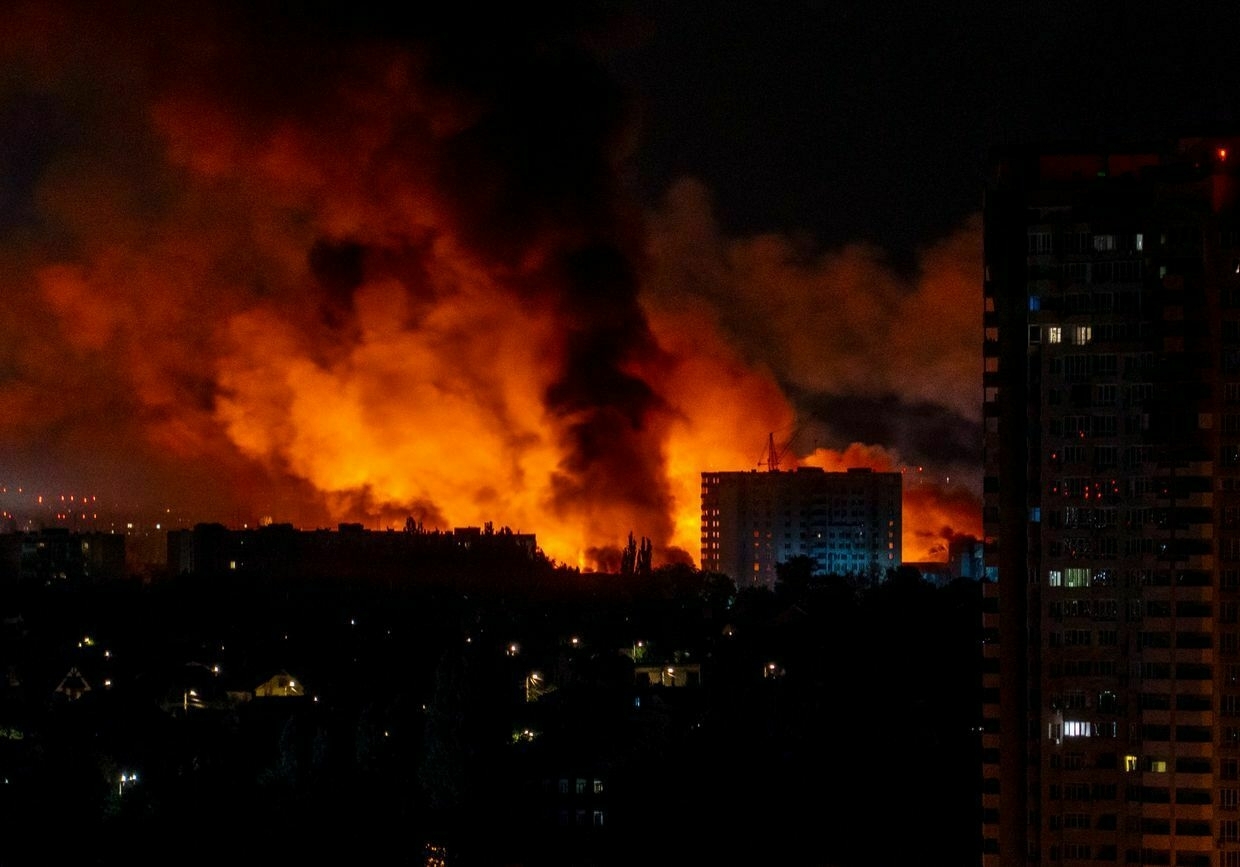
-
Weapons will come! Trump promises to continue military aid to Ukraine #shorts
-
Zelensky and Trump discuss air defense and joint drone production amid tensions with Russia
In a pivotal conversation on Friday, July 4, Ukraine's President Volodymyr Zelensky engaged in what he described as a "very important and useful" dialogue with U.S. President Donald Trump. The Presidents discussed Russian aerial strikes, drone production, and investment opportunities. Zelensky stated, "Today, we addressed the situation: Russian aerial assaults and the broader scenario on the front lines. President Trump is well-informed, and I appreciate this attention to Ukraine. We discussed air defense possibilities and agreed to work on enhancing sky protection".
Zelensky further noted that there was an agreement for U.S. and Ukrainian teams to meet regarding these issues. The presidents also had an in-depth discussion about "defense industry capabilities and the potential for joint production".
Zelensky shared, "We are ready for direct projects with America and believe it is crucial for security, particularly concerning drones and related technologies. We talked about mutual procurements and investments", and exchanged views on the diplomatic situation and cooperative work with America and other partners.
Additionally, the Ukrainian head of state extended congratulations to President Trump and the American people on Independence Day. "In Ukraine, we are grateful for all the support that enables us to protect lives and our independence. We have accomplished much together with America and support all efforts to halt the killings and restore a normal, sustainable, and dignified peace. A worthy peace deal is needed, and Ukraine supports American proposals," emphasized Zelensky.
The day before, Trump held a phone conversation with Kremlin chief Vladimir Putin that lasted over an hour. Russian state media reported that during that call, Putin claimed Russia had a role in shaping the United States. He also assured that Russia "will not back down from its goals" in Ukraine. Today, Trump expressed disappointment with his discussion with Putin, as it did not appear that the Kremlin head intends to stop the war against Ukraine. This was Trump's fourth phone call with Putin, having spoken twice already in June.
-
Ukraine war latest: Russia pounds Kyiv with record overnight drone, missile attack, 1 dead, 26 injured
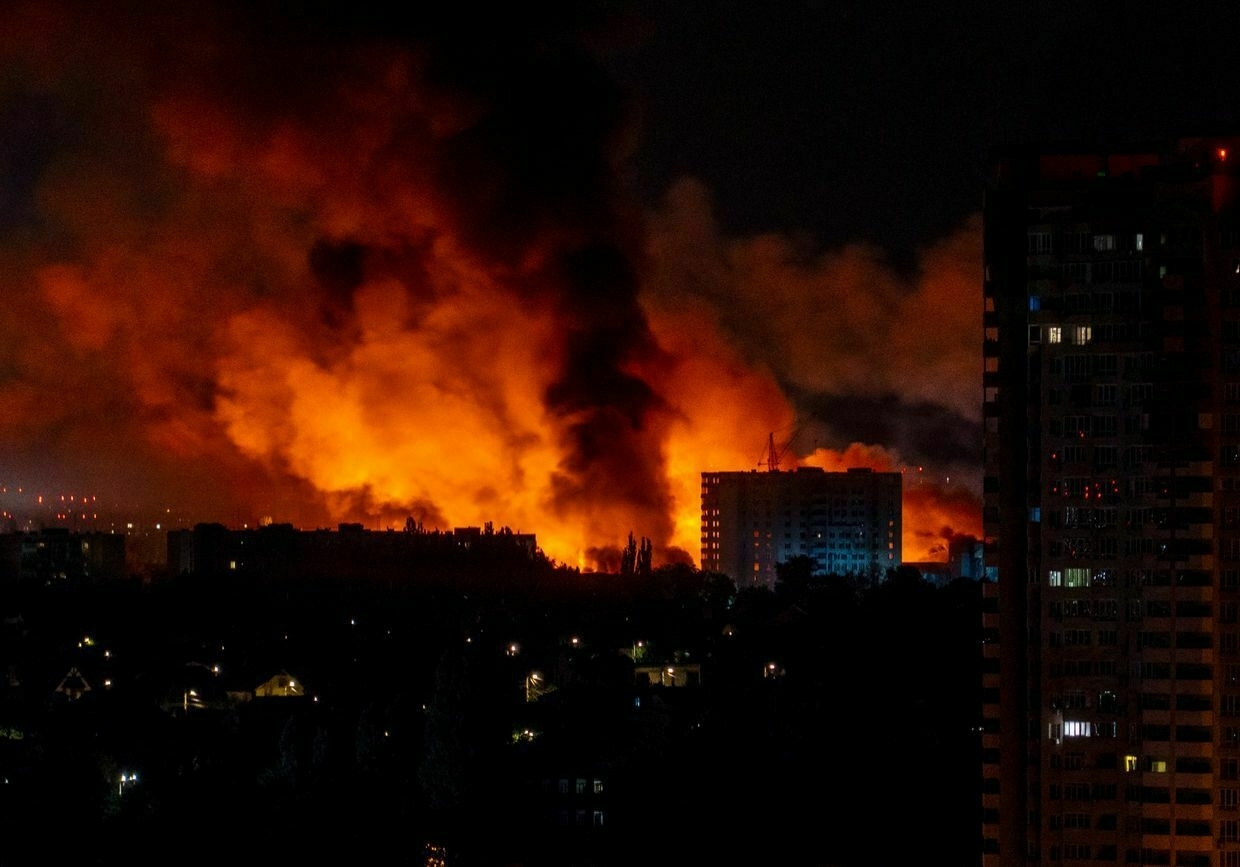
Key developments on July 4:
- ‘Nothing but terror and murder’ — Russia pounds Kyiv with record overnight drone, missile attack, 1 dead, 26 injured
- Zelensky, Trump discuss air defense, joint drone production amid Russian strikes
- ‘There is also good news’ — Ukrainian drones hit key military optics plant in Russia, General Staff confirms
- Russia intensifying use of chemical weapons in Ukraine, Dutch intelligence reports
- Ukraine, Denmark sign deal to launch Ukrainian military production on Danish soil
- Ukraine, Russia conduct new POW exchange
Explosions rocked the city of Kyiv for more than seven hours overnight on July 4, as Russia launched a record missile and drone attack targeting the capital and other cities across Ukraine.
At least one person was killed, and 26 others were injured in Kyiv, the State Emergency Service reported.
Mayor Vitali Klitschko said 14 people had been hospitalized, while Tymur Tkachenko, head of the Kyiv City Military Administration, in the afternoon confirmed a body had been found during rescue operations.
President Volodymyr Zelensky said Russia launched a record 550 drones and missiles during the seven-hour barrage. Kyiv Independent journalists on the ground heard multiple rounds of explosions in the city beginning around 8 p.m. local time on July 3 and continuing into the early hours of July 4
The attack damaged apartment buildings, businesses, a school, a medical facility, railway lines, and other civilian infrastructure in multiple districts. Fires blazed across the city, making the air dangerous to breathe.
“Russia, a terrorist country, has wreaked havoc,” Tkachenko wrote on Telegram. “The Russians bring nothing but terror and murder. That is a fact."
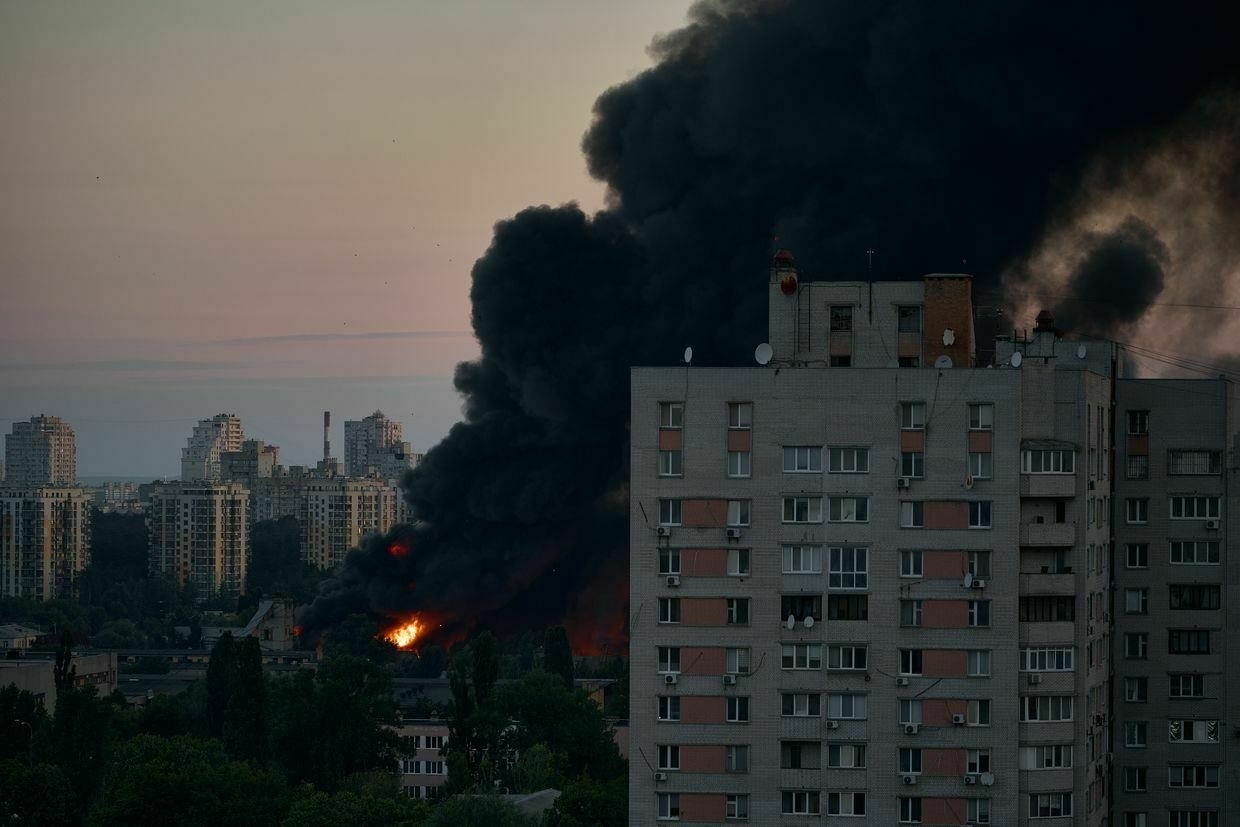
Smoke rises from a fire after a mass Russian drone and missile attack in Kyiv, Ukraine, on July 4, 2025. (Kostiantyn Liberov / Libkos / Getty Images) Ukraine’s Air Force reported that Russia had launched a ballistic missile towards Kyiv at around 12:30 a.m., and then additional missiles around 2:30 a.m.
As officials reported real-time updates on damage and casualties amid the ongoing assault, Kyiv Independent reporters in the city said that smoke from explosions clogged the air even in neighborhoods far from the attack sites.
“The first air raids in our cities and regions began yesterday, almost simultaneously with the start of media discussions of President Trump’s phone call with Putin,” Zelensky said in a post on social media on July 4.
“This was one of the largest-scale air attacks — deliberately massive and cynical… Russia is once again demonstrating that it is not going to end the war and terror."
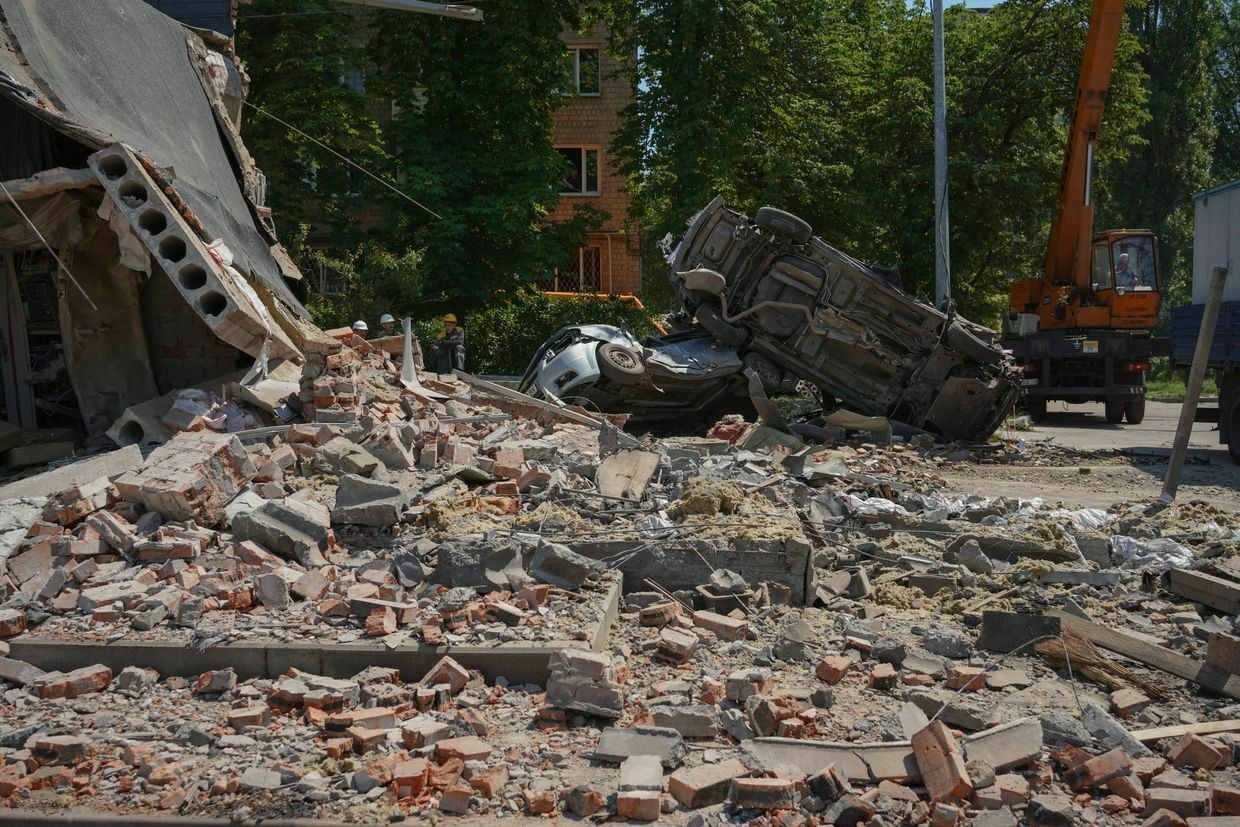
Destroyed building and burned cars after a massive drone and missile attack in Kyiv, Ukraine, on July 4, 2025 (Elena Kalinichenko/The Kyiv Independent). Polish Foreign Minister Radoslaw Sikorski said that the consular section of Poland’s embassy in Kyiv was damaged during Russia’s attack on Kyiv. “I just spoke with Ambassador (Piotr) Lukasiewicz; everyone is safe and unharmed,” Sikorski said.
He added that Ukraine urgently needs air defense systems.
Russia also targeted other regions of Ukraine with overnight attacks. Downed drones struck property and a vehicle in the city of Poltava, regional Governor Volodymyr Kohut reported. The strike injured two people.
Kyiv and other major Ukrainian cities have faced intensified drone and missile strikes in recent weeks, with Russia deploying Iranian-designed Shahed drones in record numbers.
Russia launches another horrific attack on Kyiv hours after Trump-Putin callRipe cherries and apricots fill the stalls of fruit vendors, while people bustle about on a scorching July Friday. Yet just a five-minute walk from the stand, the scene shifts dramatically: a gaping hole mars the five-story residential building where the stairwell once stood. Rescuers tirelessly sift through theThe Kyiv IndependentKateryna Hodunova

Zelensky, Trump discuss air defense, joint drone production amid Russian strikesPresident Volodymyr Zelensky and U.S. President Donald Trump held a phone conversation on July 4, agreeing to strengthen Ukraine’s air defenses, Zelensky announced on Telegram.
The call came as Russia escalated its aerial campaign across Ukraine.
“Today we discussed the situation: Russian air strikes and, more broadly, the situation on the front lines. President Trump is very well informed,” Zelensky said.
“We discussed air defense options and agreed to work on increasing airspace protection. We agreed on a meeting between our teams."
Zelensky said the two leaders also discussed Ukraine’s defense industry potential and explored possibilities for direct cooperation with U.S. partners.
“We are ready for direct projects with America and believe that this is extremely necessary for security, especially with regard to drones and related technologies,” he added.
Trump told Zelensky that the U.S. is willing to assist Ukraine with air defense amid intensified Russian strikes, Axios reported, citing unnamed sources. The call between the two presidents reportedly lasted about 40 minutes.
This conversation followed a phone call between Trump and Russian President Vladimir Putin on July 3, during which the Kremlin said Putin reaffirmed that “Russia will continue to pursue its goals” in its war against Ukraine despite U.S. calls for a ceasefire.
Trump told reporters on July 3 that he was “very disappointed” by the conversation with Putin.
“I don’t think he’s there… I don’t think he’s looking to stop this fighting."
The call also followed the U.S. Defense Department’s decision to pause shipments of key weapons systems to Ukraine, including Patriot missiles and precision-guided artillery rounds. Kyiv has warned that the delay threatens to weaken its air defenses and emboldens Moscow.
Despite repeated expressions of frustration about Russia’s continued aggression, Trump’s administration has yet to impose new sanctions or approve additional aid for Ukraine since taking office in January.
While Russia and Ukraine resumed direct talks in Istanbul this year, the two rounds of negotiations — on May 16 and June 2 — have yielded only prisoner exchanges and no progress toward a ceasefire.
Russia damages Chinese consulate in Odesa as Chinese drone parts found in Kyiv following similar attackChina has not publicly acknowledged the incident or reported any damage to its diplomatic premises in Odesa.The Kyiv IndependentTim Zadorozhnyy
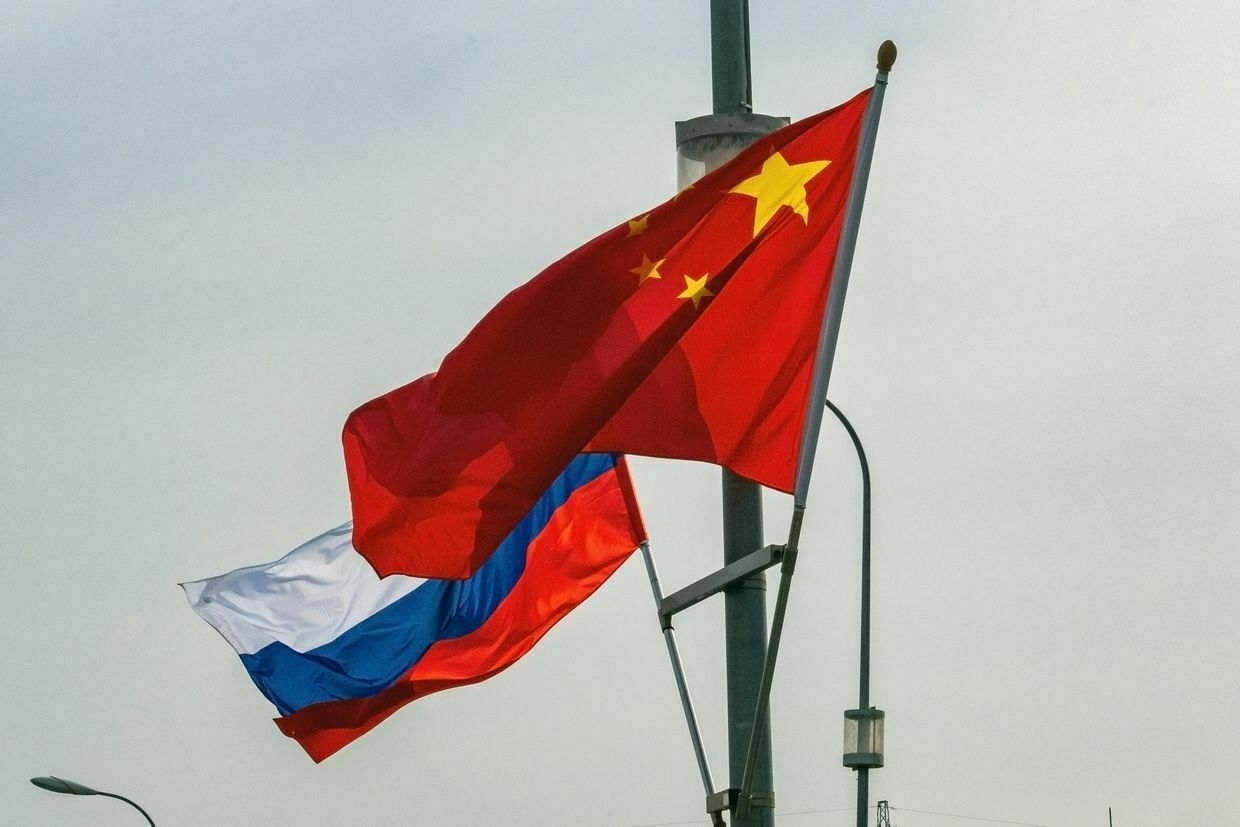
‘There is also good news’ — Ukrainian drones hit key military optics plant in Russia, General Staff confirmsDrones struck multiple targets in Russia overnight on July 4, including a high-value defense facility in the southern Rostov Oblast, according to Andrii Kovalenko, head of the counter-disinformation center at Ukraine’s National Security and Defense Council.
Kovalenko said a drone hit the Azov Optical and Mechanical Plant in the town of Azov, Rostov Oblast. The facility reportedly manufactures critical components for the Russian military, including sights, rangefinders, thermal imaging systems, and fire control equipment for tanks, infantry fighting vehicles, ships, and aircraft.
“Despite the difficult night, there is also good news. There were attacks on facilities in Russia, particularly in Moscow and Rostov oblasts,” Kovalenko wrote. “This is where the ‘eyes’ for Russian armored vehicles are assembled."
Overnight on July 4, Russia launched a massive drone and missile assault on multiple Ukrainian cities, with Kyiv as the primary target. At least 23 people were injured in the capital amid widespread destruction and high levels of air pollution.
Ukraine’s General Staff later confirmed that its drone units struck the Scientific Research Institute of Applied Chemistry (FNTs NIIPKh) in Sergiyev Posad, Moscow Oblast.
The military said the facility is involved in the production of thermobaric warheads for Shahed-type drones and plays a critical role in Russia’s airstrike capabilities.
Russia’s Defense Ministry later claimed that air defense systems had intercepted or destroyed 48 Ukrainian drones overnight. According to the ministry, 26 were downed over Rostov Oblast, 12 over Kursk Oblast, six over Belgorod Oblast, three over Oryol Oblast, and one over Lipetsk Oblast.
The Kyiv Independent could not independently verify these claims.
China’s foreign minister tells EU that Beijing cannot afford Russia to lose in Ukraine, media reportsChina’s Foreign Minister Wang Yi reportedly told the EU’s top diplomat Kaja Kallas on July 3 that the country cannot afford for Russia to lose the war in Ukraine amid fears the U.S. would shift focus towards Beijing, the South China Morning Post (SCMP) reported, citing sources familiar with the conversation.The Kyiv IndependentDmytro Basmat
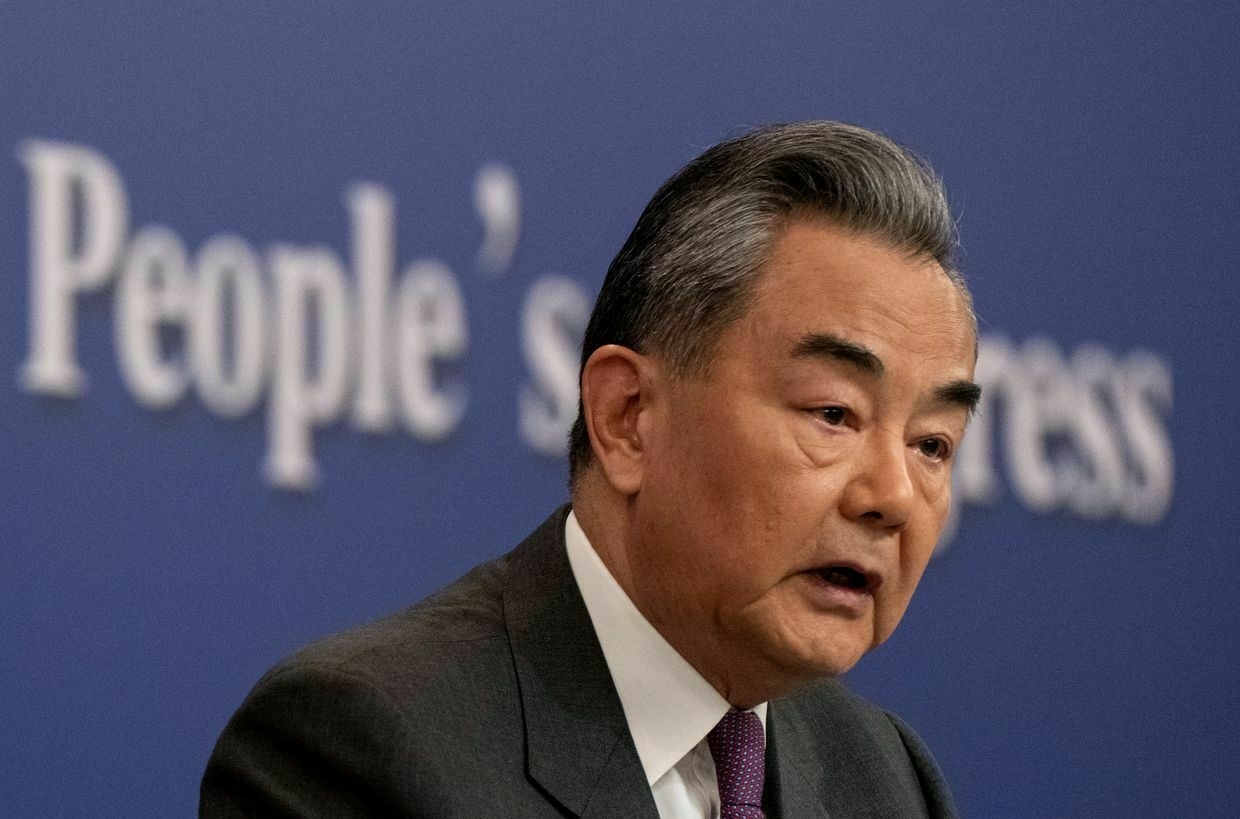
Russia intensifying use of chemical weapons in Ukraine, Dutch intelligence reportsRussia is escalating the use of chemical weapons against Ukrainian forces, the Netherlands Military Intelligence (MIVD) reported on July 4.
Russian troops use banned chemical agents as psychological warfare to panic Ukrainian forces, forcing soldiers from dugouts and trenches with gas grenades dropped by drones, making them easy targets for subsequent drone or artillery attacks.
According to MIVD report, it was previously known that Russia used tear gas, but now intelligence has confirmed the use of chloropicrin — a substance that can kill in high concentrations in enclosed spaces.
Use of of chloropicrin, banned under international law, was discovered by the Netherlands Military Intelligence and Security Service (MIVD) and General Intelligence and Security Service (AIVD) together with the German foreign intelligence service BND.
The Kyiv Independent previously reported rising chemical attacks, but Ukraine could not accurately identify the chemical substances due to lack of equipment.
The U.S. State Department had already reported in May that Russian forces have used the chemical agent chloropicrin in Ukraine. The May 1 announcement was part of a larger statement about the introduction of new U.S. sanctions against more than 280 individuals and entities.
For now, the original statement has been removed from the U.S. State Department website.
Russia is using this type of weapon more frequently and “with ease,” says MIVD Director Vice Admiral Peter Reesink.
Dutch Defense Minister Ruben Brekelmans, who announced the news to the Dutch parliament, called the situation “absolutely unacceptable,” calling for “more sanctions, isolation of Russia and unwavering military support for Ukraine."
“We are making this public now because Russia’s use of chemical weapons must not become normalized,” Brekelmans said. “If the threshold for using this type of weapon is lowered, it is dangerous not only for Ukraine but also for the rest of Europe and the world."
Since the start of the full-scale invasion in 2022, Russia has conducted over 9,000 chemical attacks. At least three Ukrainian soldiers have died directly from exposure to toxic substances, according to Ukraine’s Defense Ministry.
Dutch intelligence has established that Russian military leadership actively facilitates chemical attacks, and the use of banned substances has become standard practice for Russian forces.
Moscow is also increasing investments in chemical weapons programs, expanding research, and recruiting new scientists, MIVD and AIVD observe.
The U.S. has accused Russia of deploying chloropicrin, often used in agriculture and widely weaponized as a “vomiting agent” during World War I.
Number of Ukrainian children killed and injured amid Russian full-scale invasion jumps threefold in recent monthsThe latest U.N. figures show a threefold jump in the number of deaths and injuries for children over the three months ending in May. The Kyiv IndependentThe Kyiv Independent news desk
The Kyiv IndependentThe Kyiv Independent news desk
Ukraine, Denmark sign deal to launch Ukrainian military production on Danish soilKyiv and Copenhagen signed a landmark agreement on July 4 that allows Ukrainian defense companies to open production facilities in Denmark, Strategic Industries Minister Herman Smetanin announced.
“This is a unique case of international cooperation for the Ukrainian defense industry,” Smetanin wrote on Facebook, following the signing ceremony in Copenhagen alongside Danish Industry Minister Morten Bodskov.
The deal marks the first time Ukrainian defense technologies will be exported abroad specifically for supply to Ukraine’s own Armed Forces, he said.
A year ago, Denmark became the first country to fund weapons production by Ukrainian manufacturers. Now, it has become the first to host Ukrainian arms production lines on its territory, Smetanin added.
“Today, it has become the first country to which Ukraine exports its own defense technologies for production, scaling, and supply to the Ukrainian army,” he said.
The agreement is part of Ukraine’s broader effort to internationalize its defense production. President Volodymyr Zelensky announced on June 21 that Kyiv would soon begin exporting defense technologies and opening weapons production lines in partner countries.
To scale up domestic and international production, Zelensky has called on foreign partners to finance new projects and match Ukraine’s rapidly growing manufacturing capacity.
Denmark has been a key backer of Ukraine since the start of Russia’s full-scale invasion in 2022. In February 2024, Copenhagen signed a 10-year bilateral security agreement with Kyiv, pledging long-term defense cooperation until Ukraine secures NATO membership.
Trump envoy Steve Witkoff pushing to lift energy sanctions on Russia, Politico reportsWhile Special Envoy Steve Witkoff is reportedly advocating for the easing of energy sanctions, others in the administration disagree. Interior Secretary Doug Burgum favors reducing U.S. reliance on Russian imports rather than expanding trade, according to Politico. The Kyiv IndependentAnna Fratsyvir
The Kyiv IndependentAnna Fratsyvir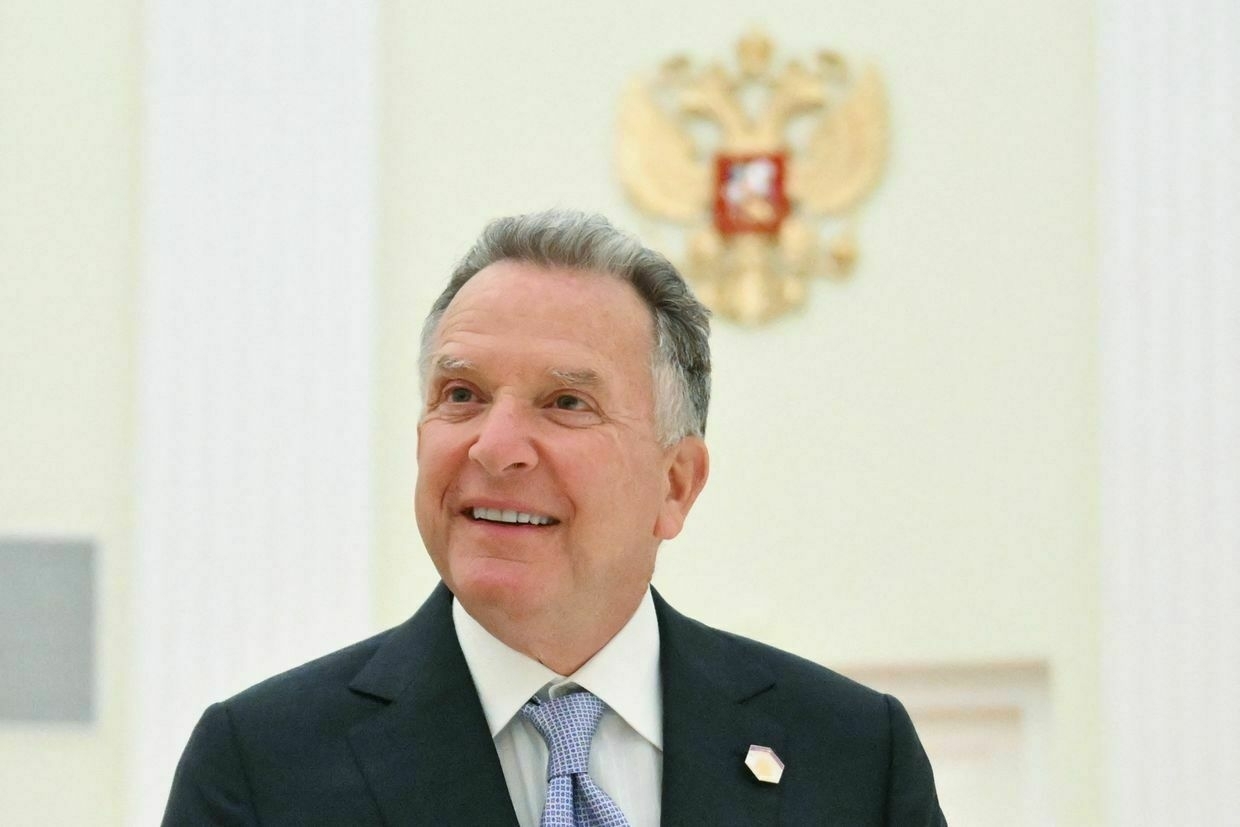
Ukraine, Russia conduct new POW exchangeA new prisoner of war (POW) exchange with Russia has taken place, bringing home another group of Ukrainian soldiers held in Russian captivity, many since 2022, President Volodymyr Zelensky confirmed on July 4.
“Our people are home. Most of them had been in Russian captivity since 2022,” Zelensky said in a statement.
According to Ukraine’s Land Forces, the group includes prisoners categorized as “wounded and seriously ill,” those “under the age of 25,” and civilians.
The exchange follows five swaps that occurred in June under the Istanbul deal reached between Ukraine and Russia on June 2. The agreement provided for the regular release of severely ill and wounded POWs from both sides, as well as the repatriation of the bodies of fallen soldiers.
Previous swaps have brought home service members from the Armed Forces, National Guard, and State Border Guard Service, many of whom were captured in 2022 during the start of Russia’s full-scale invasion.
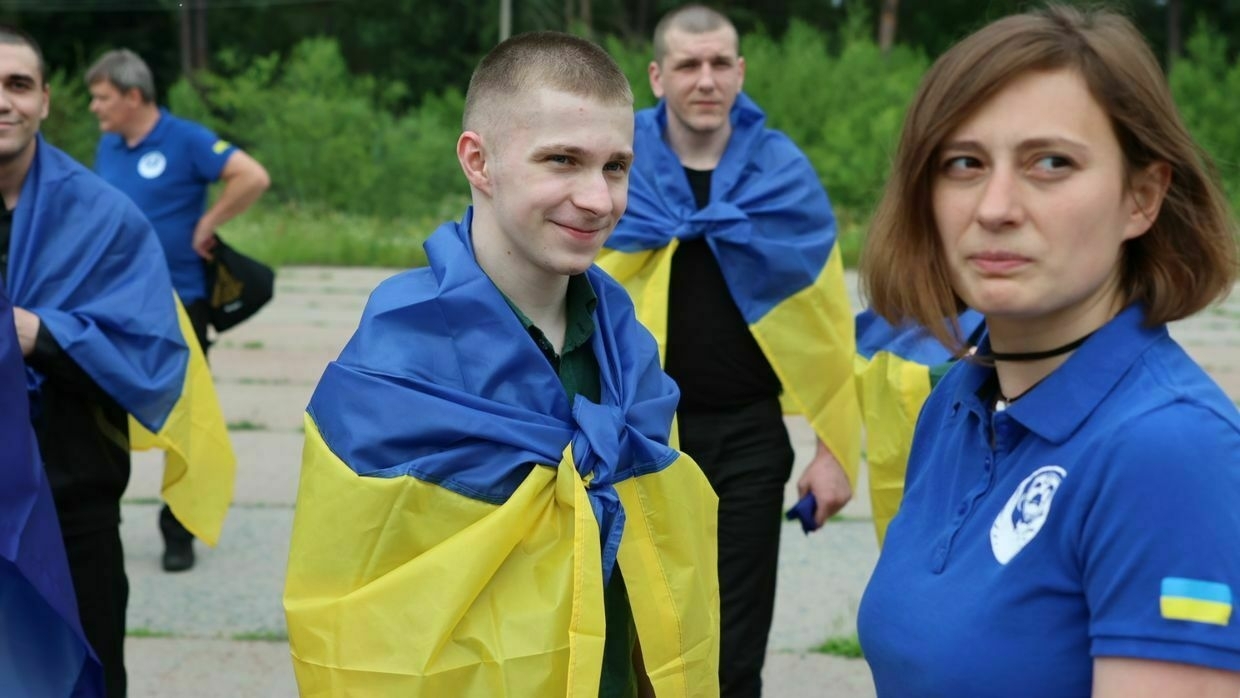
Recently released Ukrainian prisoners of war returned home following a POW exchange with Russia on July 4, 2025. (The Coordination Headquarters for Prisoners of War / Telegram) “Exchanges must continue, and I thank everyone who makes this possible,” Zelensky said. “Ukraine’s goal is to free all our people from Russian captivity. I thank everyone who helps make that happen."
Russia’s Defense Ministry confirmed the exchange on July 4, without disclosing the number of soldiers returned.
Previous exchanges have focused on individuals with serious medical needs resulting from injuries and harsh conditions in captivity. Some previously released prisoners had defended Mariupol during the 2022 siege, while others fought in regions including Donetsk, Luhansk, Kherson, and Kyiv oblasts.
The Istanbul agreement followed months of stalled negotiations and was hailed as a humanitarian breakthrough despite the lack of broader political progress.
Ukraine continues to advocate for a full-scale “all-for-all” exchange, a proposal that Russia has so far rejected. Still, both sides have carried out smaller, phased swaps, sometimes multiple in a single week.
Note from the author:
Ukraine War Latest is put together by the Kyiv Independent news desk team, who keep you informed 24 hours a day, seven days a week. If you value our work and want to ensure we have the resources to continue, join the Kyiv Independent community.
-
Will Trump resume aid? Zelenskyy calls for action after new Russian attacks | News Pulse
-
Zelensky blames Putin-Trump call for massive Russian airstrike on Ukraine
Following a conversation between Russian President Vladimir Putin and former U.S. President Donald Trump, Russian forces launched a massive airstrike on Ukraine, with Kyiv as the primary target. Ukrainian President Volodymyr Zelensky described the attack as one of the most significant and cynical since the full-scale war began, closely timed with media coverage of the call.
In a series of overnight assaults on June 3rd and 4th, Russia launched 550 targets across Ukraine, many of which were aimed at the capital. During the same period, news broke about the phone call between Putin and Trump. Zelensky stated, "It was one of the most widespread airstrikes, a demonstratively powerful and cynical blow."
According to Zelensky, over 330 of the airborne targets were Iranian Shahed drones. Additionally, ballistic and cruise missiles were used. Ukrainian air defense forces were able to destroy 270 aerial targets, and electronic warfare efforts suppressed 208 drones. Air raid alarms in Kyiv lasted until nearly 9 a.m.
Zelensky highlighted the inaugural use of interceptor drones, which successfully downed dozens of targets. "We are doing everything possible to improve the protection of our cities. It's critical to maintain partner support for ballistic defense. The Patriot systems and their missiles are real lifesavers," he noted.
In addition to Kyiv, attacks targeted the Dnipropetrovsk, Sumy, Kharkiv, Chernihiv, and Kyiv regions, injuring 23 people, including a child. There were direct hits and widespread debris from drones and missiles. Firefighting and debris clearance are ongoing.
The President emphasized that Russia is committed to continuing its aggression, maintaining terrorism as its primary means of exertion. He remarked, "Without substantial and meaningful pressure, it's evident that Russia won't alter its foolish and destructive behavior. For every strike on people and life, they must feel the burden of sanctions affecting their economy, income, and infrastructure."
He asserted that the change largely depends on Western allies, particularly the United States.
Russia executed its largest airstrike since its invasion, deploying 550 targets, of which 478 were destroyed by Ukrainian air defense, with Kyiv being the focal point of the assault.
Additionally, Ukraine's Foreign Minister Andriy Sybiha stated that Putin intentionally attacked Kyiv following his conversation with Trump, orchestrating one of the harshest nights of warfare thus far by deploying hundreds of drones and missiles.
-
Russia launches another horrific attack on Kyiv hours after Trump-Putin call
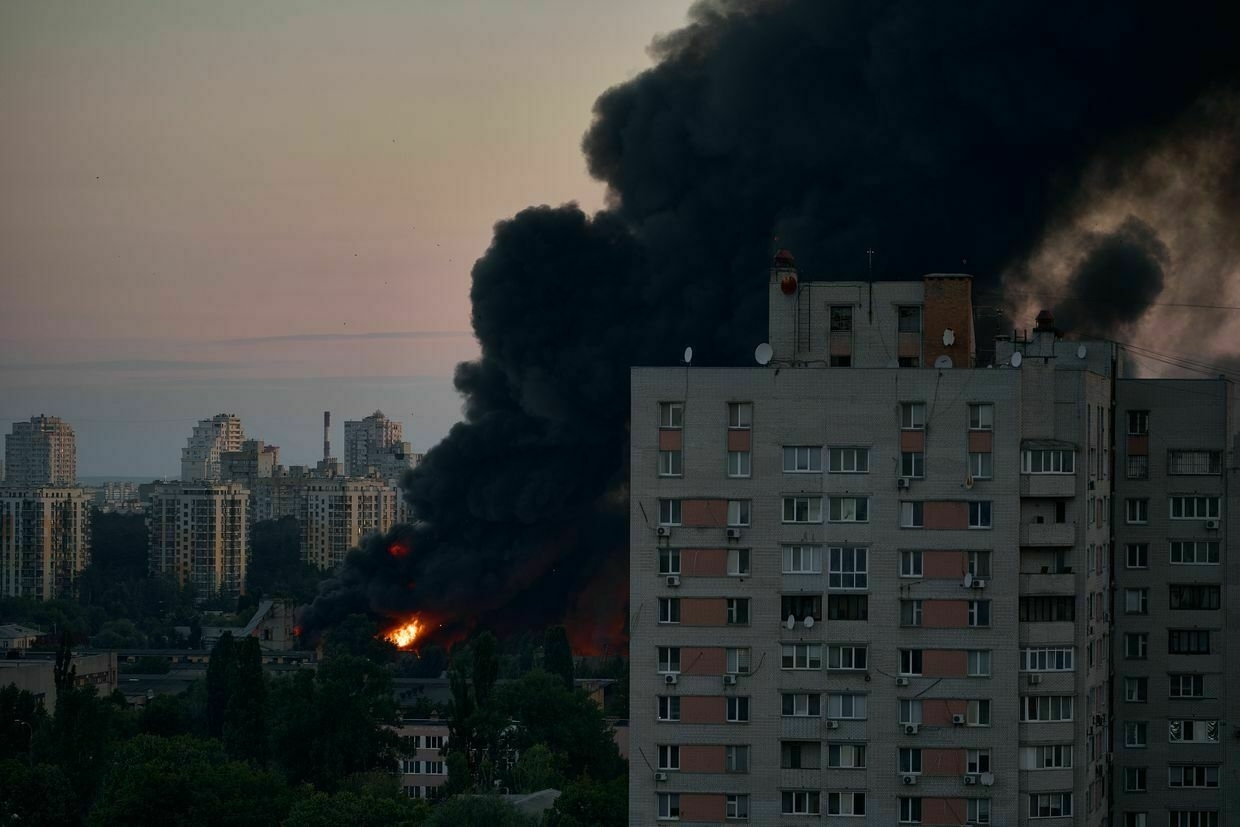
KYIV — Ripe cherries and apricots fill the stalls of fruit vendors, while people bustle about on a scorching July Friday.
Yet just a five-minute walk from the stand, the scene shifts dramatically: a gaping hole mars the five-story residential building where the stairwell once stood. Rescuers tirelessly sift through the rubble, and a fragment of a Russian drone lies abandoned in the middle of the road.
Overnight on July 4, hours after U.S. President Donald Trump spoke with his Russian counterpart, Vladimir Putin, in the hope of bringing the war to an end, Russia launched 270 Russian drones and ballistic missiles at the Ukrainian capital, injuring at least 24 people and killing one.
The Russian strike damaged residential buildings, businesses, a school, a medical facility, railway lines, and other civilian infrastructure in multiple districts.
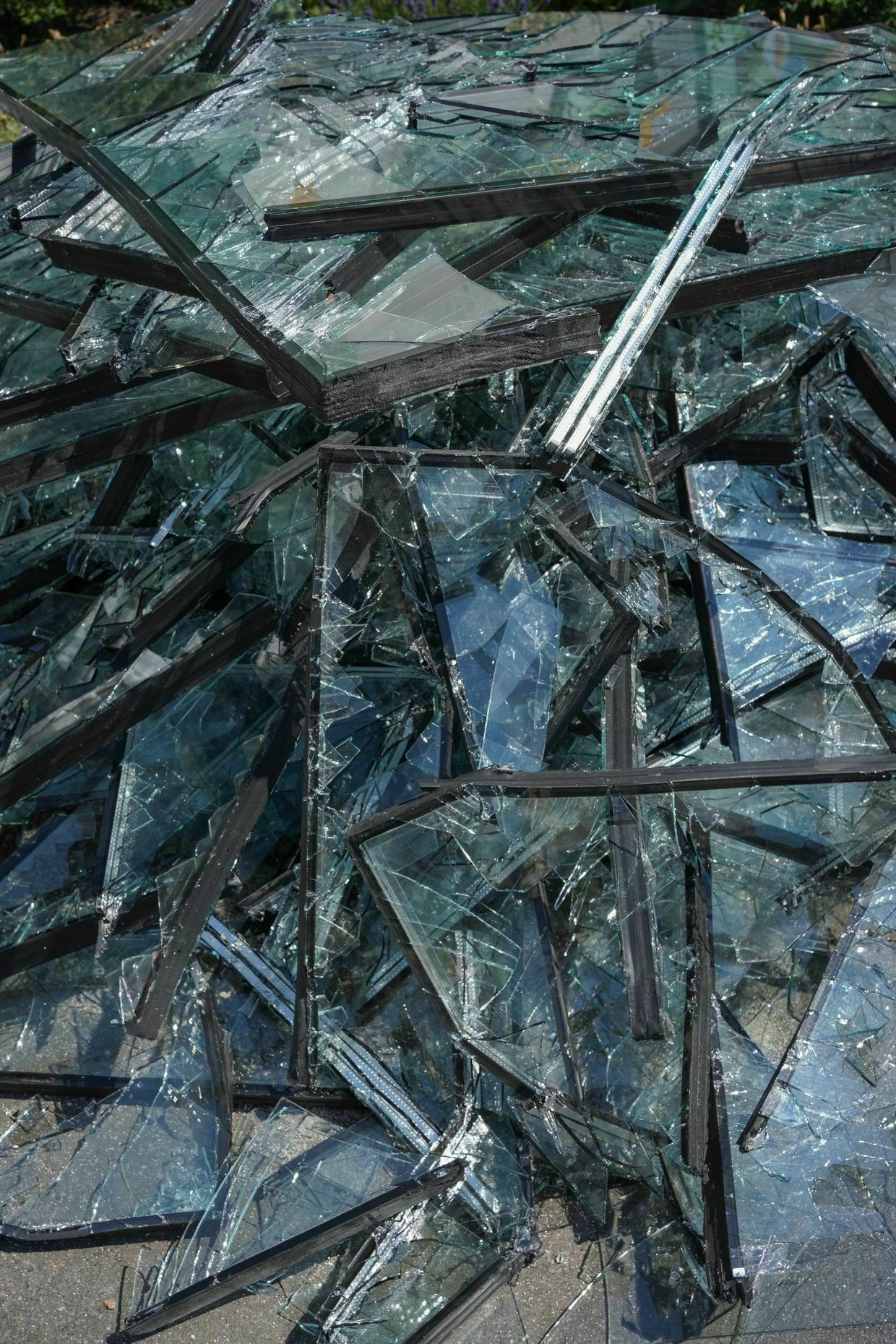
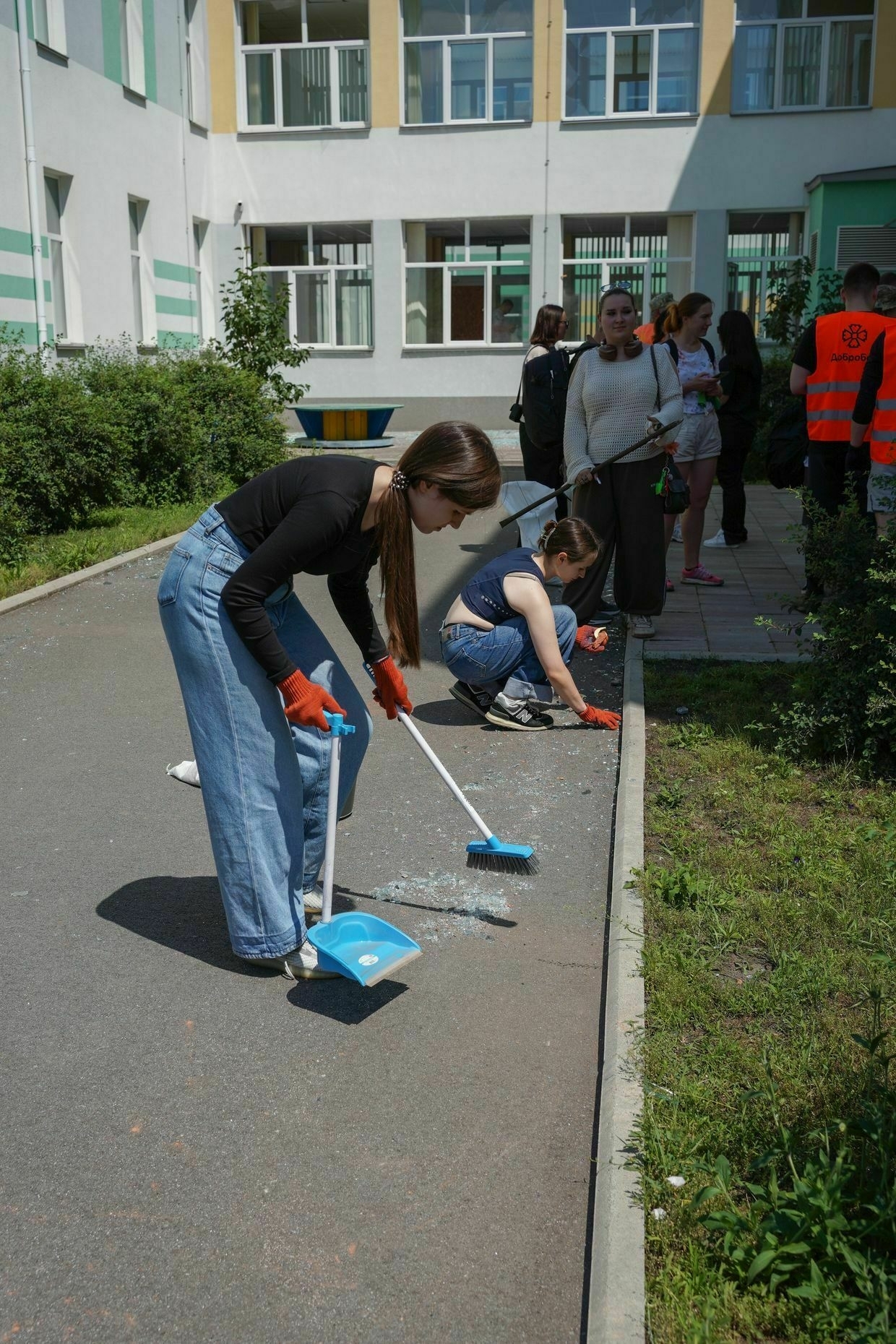
L: Debris is seen after a mass Russian drone and missile attack in Kyiv, Ukraine, on July 4, 2025. (Elena Kalinichenko / The Kyiv Independent). R: People clean up debris after a mass Russian drone and missile attack in Kyiv, Ukraine, on July 4, 2025. (Elena Kalinichenko / The Kyiv Independent). Kyiv, a refuge for countless Ukrainians escaping the war in the east and south, grows more perilous each day as Russia escalates its drone and missile attacks on the city. Russia has recently been unleashing nearly 500 drones each night, both decoys and explosive-laden.
“The explosions I heard here were unlike anything I heard in Pokrovsk. It’s just beyond words,” Lillia Kuzmenko, who left the embattled Donetsk Oblast with her husband and moved to the capital a month ago, told the Kyiv Independent.
Given the intensifying strikes, Kuzmenko, who is eight months pregnant, said she doesn’t know what to expect next.
“Everything is in God’s hands,” she said. “Fortunately, everything in our apartment is intact. But the windows were blown out nearby."
Across the street from Kuzmenko’s house, a school has come under attack for the second time since the start of the full-scale invasion. Almost two years since the last hit, the blast wave again blew out windows in classrooms, and left shrapnel marks on the colorful mural on its wall.
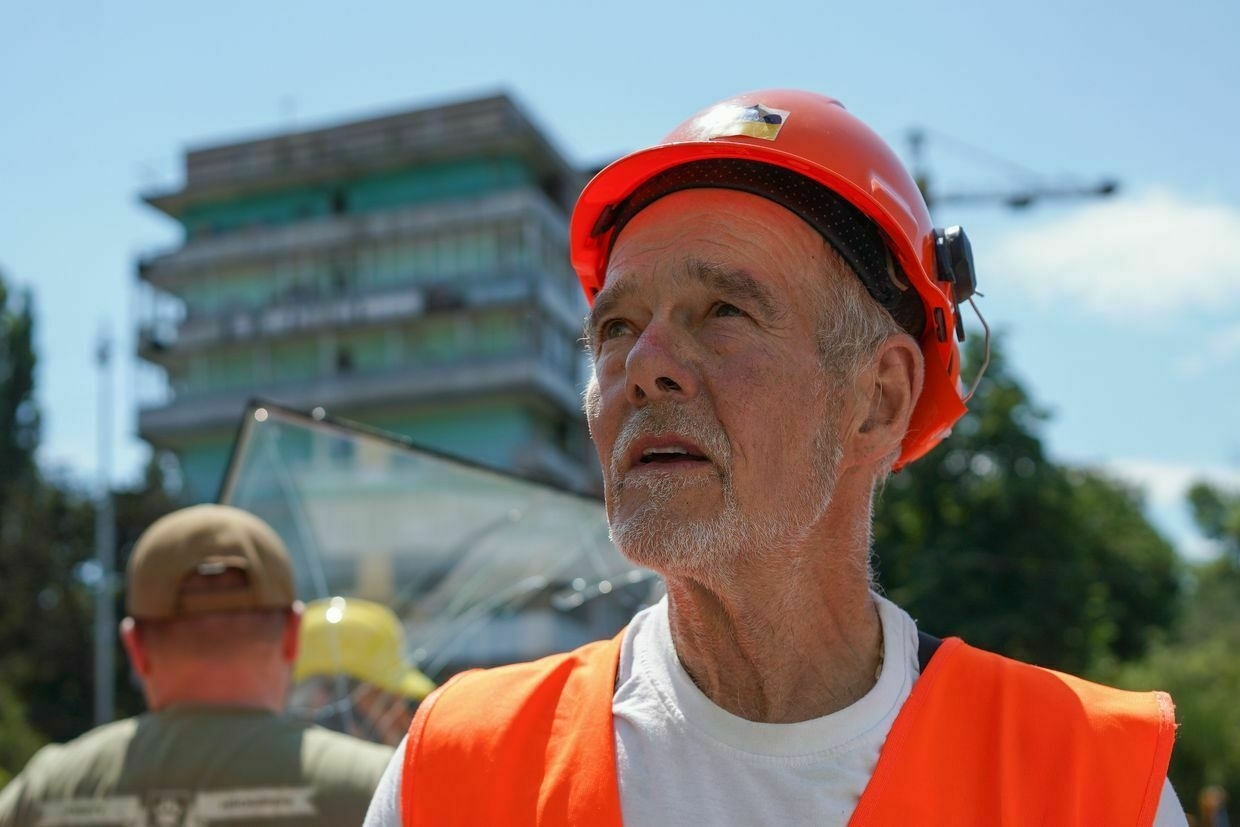
Lars Fersters, a Dobrobat volunteer, stands near a school damaged during a mass Russian drone and missile attack in Kyiv, Ukraine, on July 4, 2025. (Elena Kalinichenko / The Kyiv Independent) 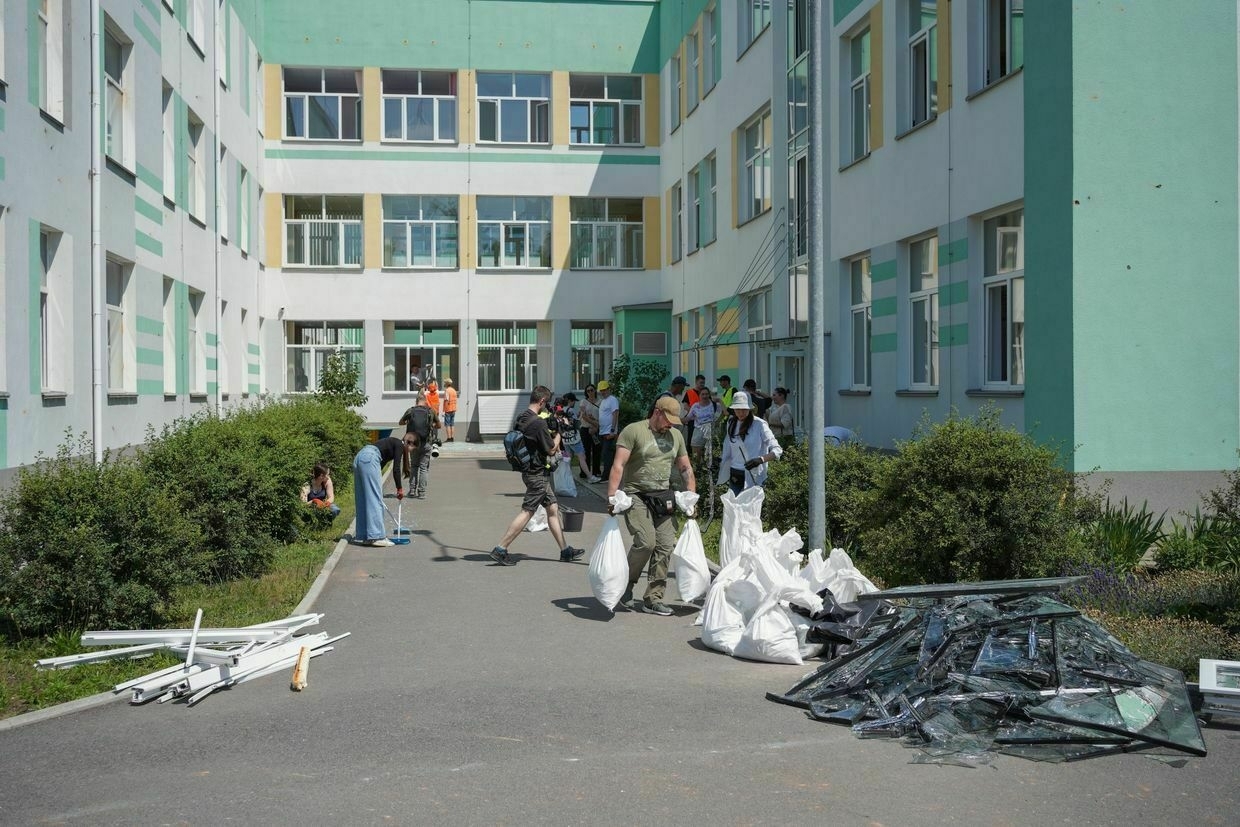
People clean up debris after a mass Russian drone and missile attack in Kyiv, Ukraine, on July 4, 2025. (Elena Kalinichenko / The Kyiv Independent) Volunteers from Dobrobat, a non-governmental organization that helps restore buildings destroyed by Russian attacks, were already sweeping up glass and other remnants of the strike in the schoolyard.
Dozens of people gathered in the yard of one of the neighboring houses, uncertain of what to do next, as their own apartment building had suffered significant damage. Some of the residents have lost their homes in the recent attack.
“There is no apartment — bare walls. Our kitchen, as well as our bathroom, is now destroyed. Everything was blown away,” Temuri Nazgaidze, a Georgian national who moved to Ukraine with his wife two years ago, told the Kyiv Independent.

Temuri Nazgaidze, a resident of a damaged home, sits in his yard with his dog, Alpha, after a mass Russian drone and missile attack in Kyiv, Ukraine, on July 4, 2025. Nazgaidze shared that he takes Alpha to the shelter during air raid alarms. “Alpha is stressed—she jumps every time she hears an explosion. She wants to sleep, but she can’t,” he said. (Kateryna Hodunova / The Kyiv Independent) As the Russian attacks intensified over the past months, Nazgaidze’s family began heading to the shelter whenever the air raid alarm sounded. He said this time it saved their lives.
“The explosion was deafening. It was very scary that the building where the shelter was located would collapse. People were screaming loudly. I thought someone had died,” Nazgaidze said.
The resident recalled this night when the drones relentlessly attacked the city like never before, and with every passing week, the fear and dread only deepened. Despite this, Nazgaidze does not want to leave Ukraine.
“This is a war between good and evil. Yes, I am Georgian, but I am with you. And I will always be with you because I love this country, and I love these people,” he said.
Note from the author:
Hello, this is Kateryna Hodunova, the author of this story. Like all the residents of Kyiv mentioned in the story, I spent the night sleepless, listening to the terrifying sounds of ballistic missiles being intercepted and drones swarming toward the capital. Each attack is more than just the number of the injured, the killed, or the damage done. It is a personal tragedy for every family affected, and I feel that pain.
If you’d like to support our work reporting on those attacks, please consider becoming our member.
Ukraine’s new interceptor UAVs are starting to knock Russia’s long-range Shahed drones out of the skyRussia’s Shahed drone swarms are pummeling Ukraine on a nightly basis, inflicting ever more death and destruction in cities that had managed to carve out some sense of normalcy amid wartime. Civilian alarm has grown. With traditional air defense stockpiles running low, the government is banking on newly createdThe Kyiv IndependentKollen Post
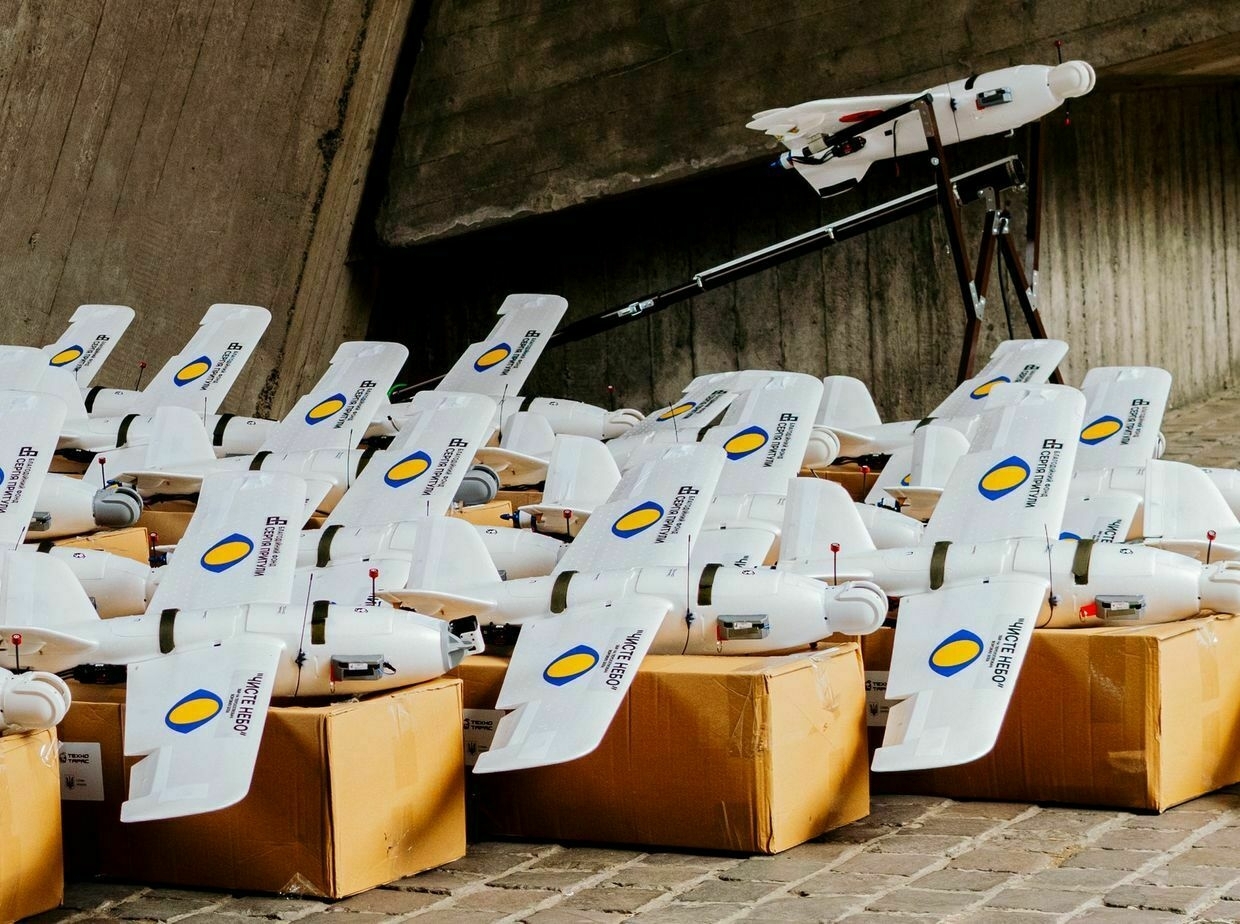
-
Zelenskyy spoke with Trump: first details #shorts
-
Russia damages Chinese consulate in Odesa as Chinese drone parts found in Kyiv following similar attack
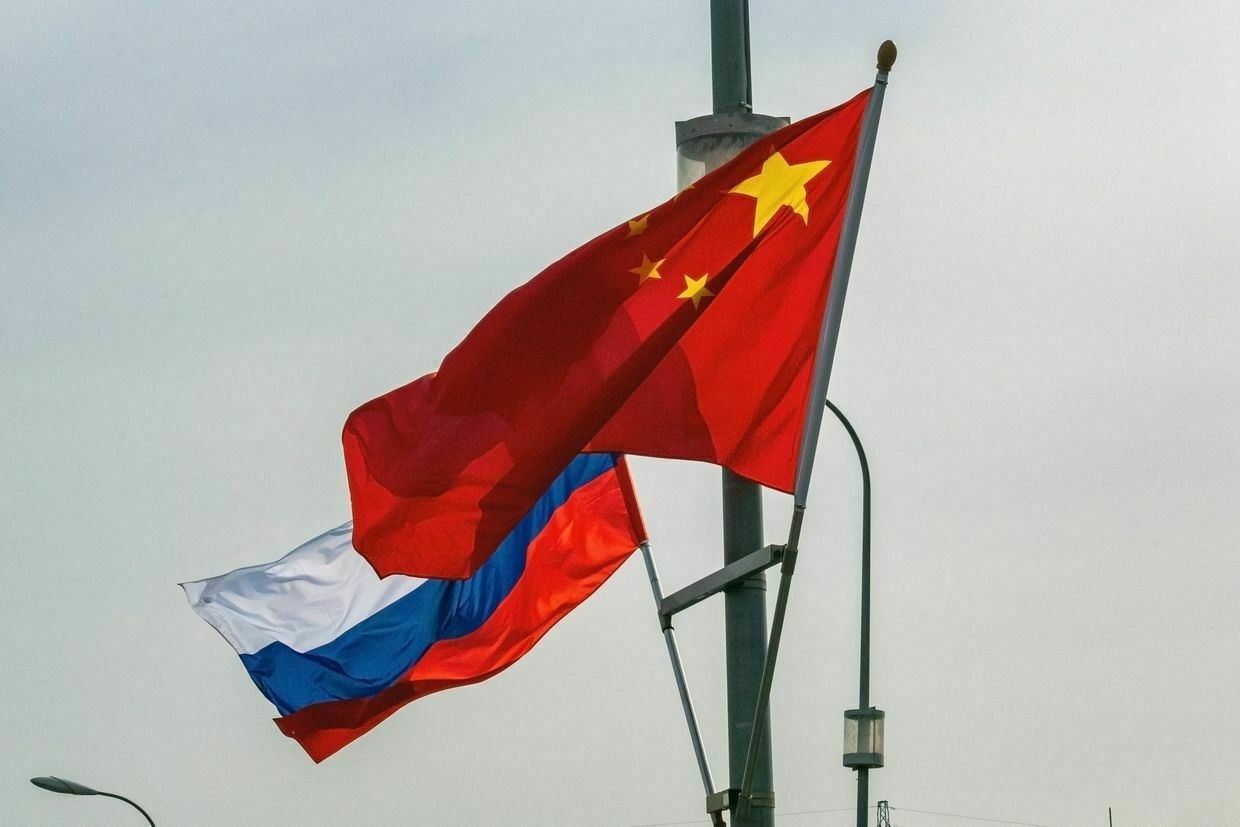
A Russian missile and drone strike on Odesa on July 3 damaged the building of the Chinese Consulate General, Foreign Minister Andrii Sybiha said on July 4.
“Following tonight’s massive Russian air attack on Ukraine, we discovered in Kyiv a component of a Russian-Iranian Shahed-136/Geran-2 combat drone, which was made in China and supplied just recently,” Sybiha wrote on X.
“And right on the eve, the Chinese Consulate General’s building in Odesa suffered minor damage."
The July 3 assault on Odesa killed two people and injured six others. China has not publicly acknowledged the incident or reported any damage to its diplomatic premises in the city.
The Shahed-136 drone, a loitering munition used by Russia in its attacks on Ukrainian cities, has been assembled in large numbers in Russia with components sourced globally.
Ukraine has previously documented that Chinese companies have contributed electronics and materials used in the production of these drones.
Beijing remains one of Russia’s key wartime partners, helping Moscow evade Western sanctions and emerging as the leading supplier of dual-use goods used by the Russian defense industry.
China’s Foreign Minister Wang Yi reportedly told EU foreign policy chief Kaja Kallas on July 3 that Beijing cannot afford for Russia to lose the war in Ukraine, according to the South China Morning Post, which cited unnamed sources familiar with the conversation.
The reported statement adds to growing concerns in Kyiv over China’s expanding role in supporting Russia’s war effort. President Volodymyr Zelensky has repeatedly accused China of siding with Moscow.
As Russian-Chinese relations deepen, Russian President Vladimir Putin is expected to visit China in September for the Shanghai Cooperation Organization summit, where he is scheduled to meet with Chinese leader Xi Jinping.
Zelensky, Trump discuss air defense, joint drone production amid Russian strikes“Today we discussed the situation: Russian air strikes and, more broadly, the situation on the front lines. President Trump is very well informed,” President Volodymyr Zelensky said.The Kyiv IndependentTim Zadorozhnyy
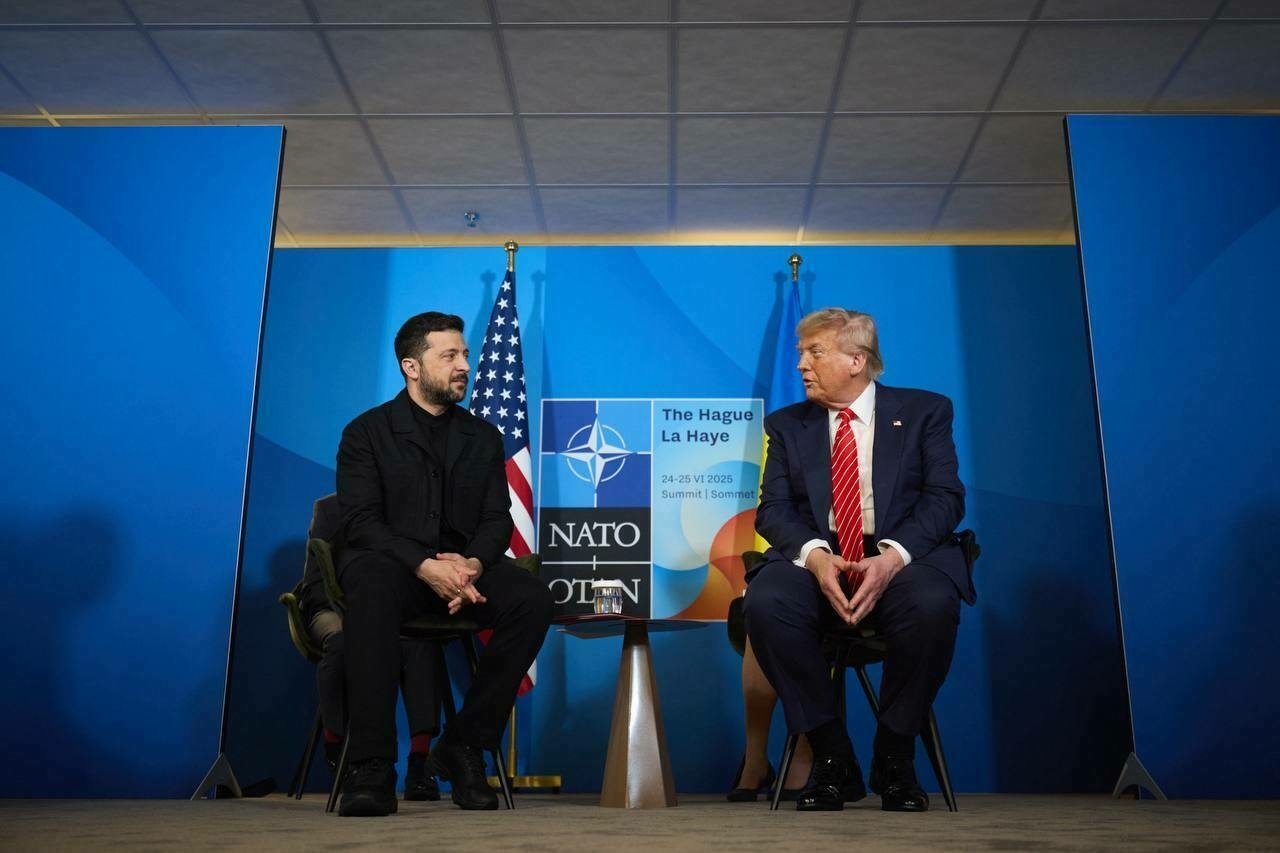
-
Zelensky, Trump hold phone call after Putin's pledge to continue war in Ukraine
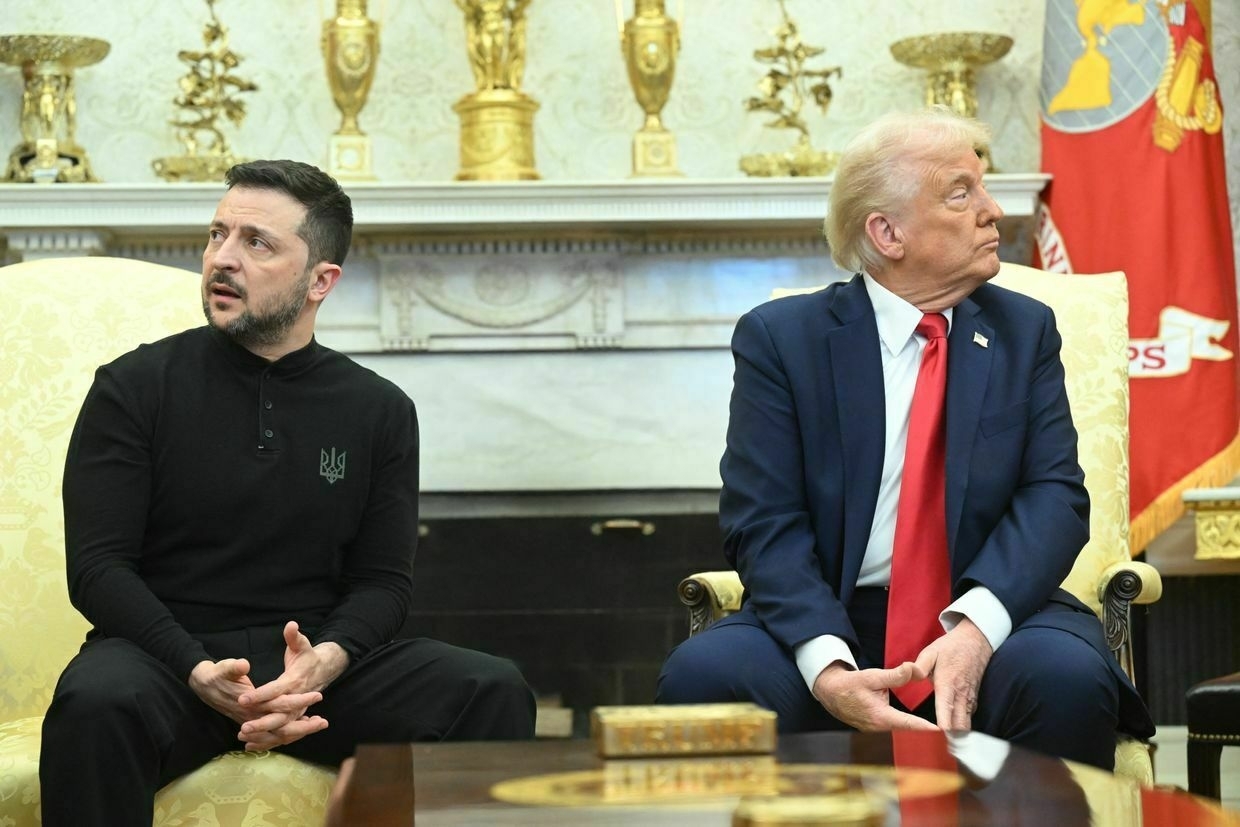
Editor’s note: This is a developing story and is being updated.
President Volodymyr Zelensky and U.S. President Donald Trump held a phone conversation on July 4, Andriy Yermak, head of Ukraine’s President’s Office, announced.
“A very important and meaningful conversation between the presidents. All details will be available very soon,” Yermak wrote on Telegram.
According to Axios correspondent Barak Ravid, the call lasted about 40 minutes. The presidents talked about the intensified Russian strikes on Ukraine and the air defense supplies, he added.
This comes a day after a phone call between Russian President Vladimir Putin and Trump, during which the Kremlin said Putin reaffirmed that “Russia will continue to pursue its goals” in its war against Ukraine despite U.S. calls for a ceasefire.
On July 3, after the phone call with Putin, the U.S. president said he was “very disappointed.”
“I’m very disappointed with the conversation I had today with President Putin,” Trump told journalists. “Because I don’t think he’s there. And I’m very disappointed. I don’t think he’s looking to stop this fighting."
‘Deliberately massive and cynical’ — Russian attack on Ukraine began as Trump and Putin spoke, Zelensky says“Patriots and their missiles are real defenders of life,” President Volodymyr Zelensky said. “It is very important to maintain the support of partners in ballistic missile defense.” The Kyiv IndependentAnna Fratsyvir
The Kyiv IndependentAnna Fratsyvir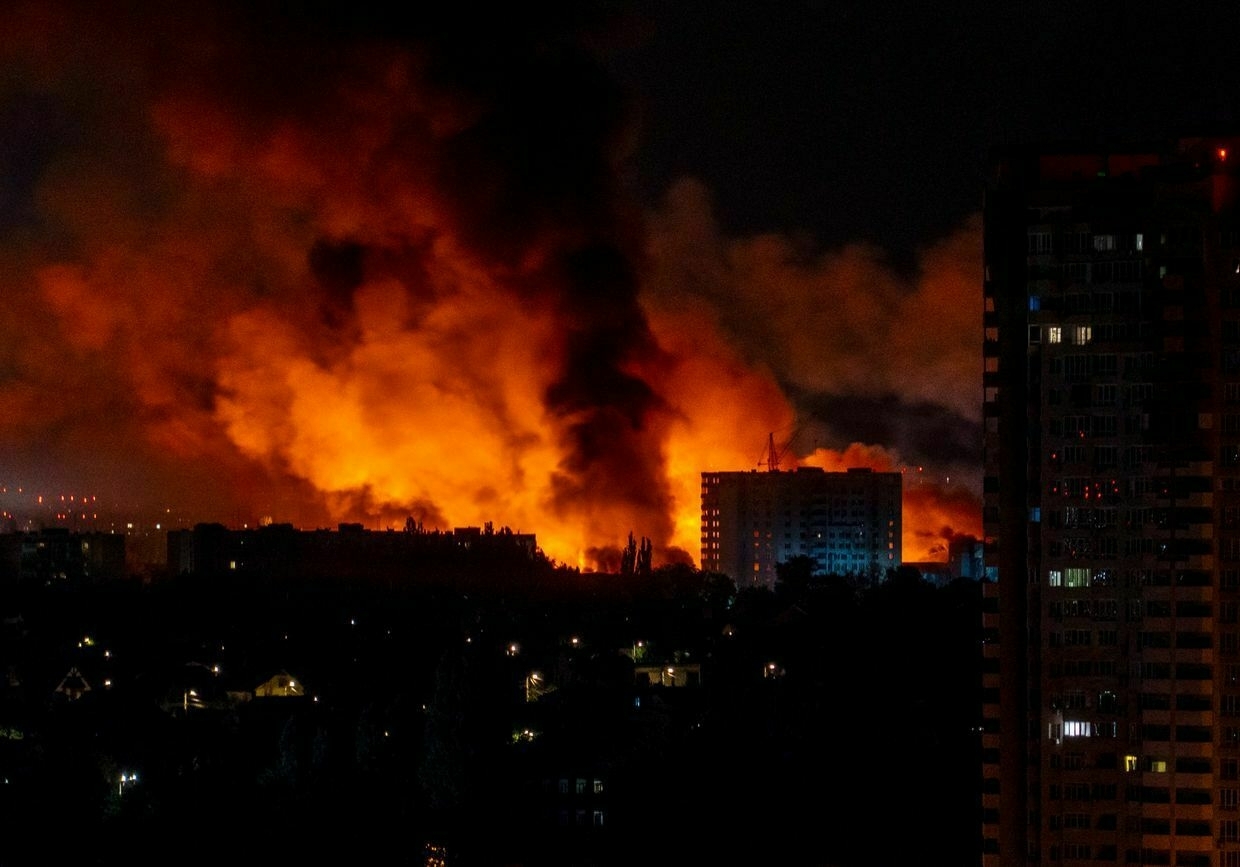
-
NEWFLASH: Kyiv ablaze on U.S. Independence Day
Editor’s note: Every week, Russia launches massive attacks on Kyiv, forcing our team to sleep in hallways. We’re collecting sleeping bags, foldable cots, ear plugs, and eye masks to make their lives a little easier.
The Counteroffensive also covers the cost of therapy sessions, as just living in Ukraine is emotionally exhausting — let alone reporting on the war.
Help us support the continued work of our team.
Kyiv on July 4, 2025. Source: @KaterynaLis on Twitter.
You know it’s bad when you wake up and can immediately taste the ash in the air.
People are being advised to stay inside with the windows closed, but the remnants of last night’s attacks – and subsequent mass fires – find their way in through cracks and crevices, an irritant that reminds of the desperate situation and American betrayal.
After all, Russia 'greeted' the U.S. with fireworks for Independence Day.
Though not in Washington, but in Kyiv.
The vibrations, the buildings shaking, the crack of air defense teams firing at incoming, the sneering buzz of Russian kamikaze drones in the dark – all remind you that there is a threat to your life.
The sudden flashes of light, followed seconds later by a lung-rattling sound wave – all send adrenaline and cortisol skyrocketing.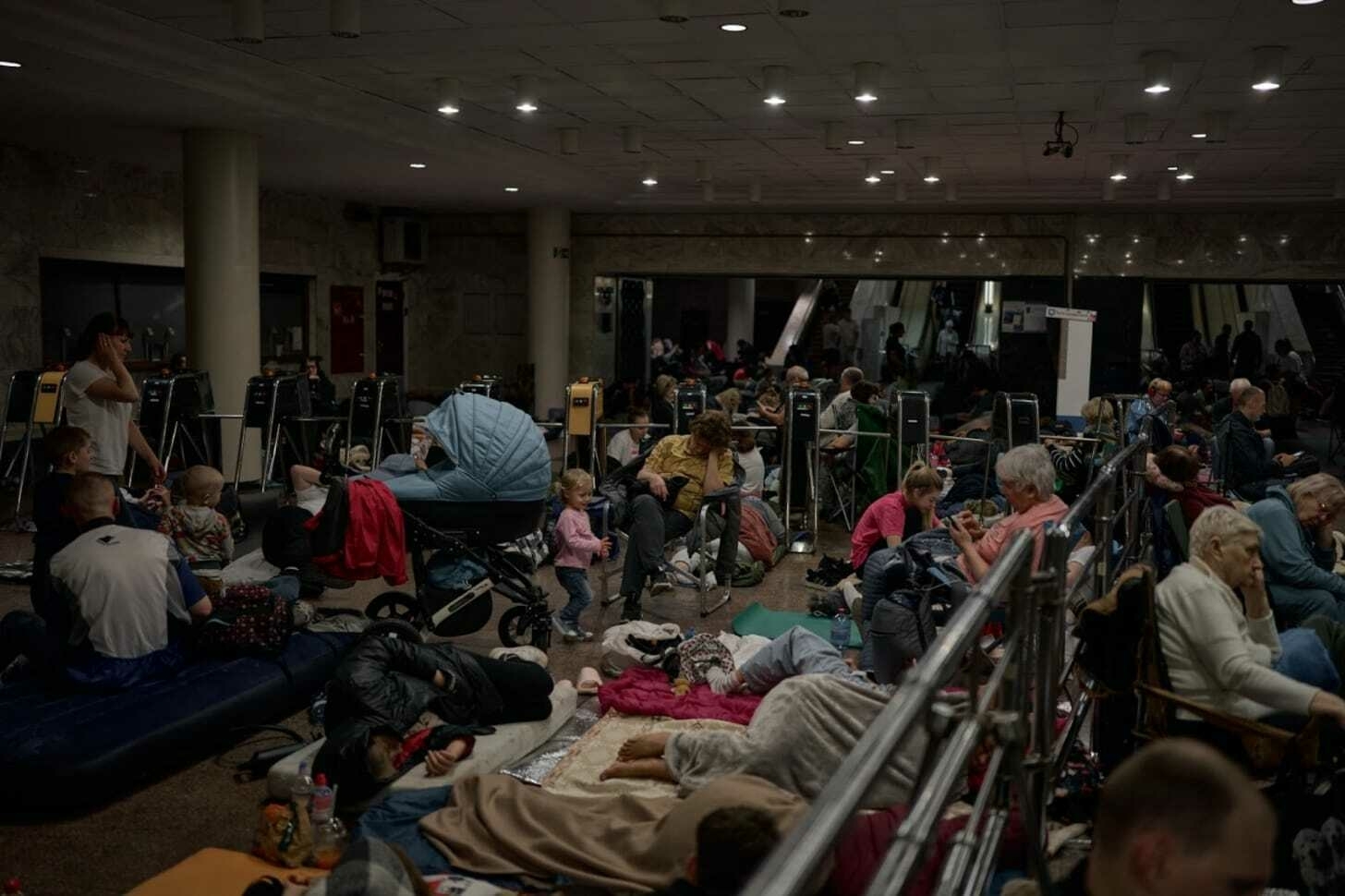
Residents descended into the metro for shelter during an air raid and a mass kamikaze drone attack on the center of the capital July 4, 2025 in Kyiv, Ukraine. (Photo by Kostiantyn Liberov/Libkos/Getty Images) After the paywall:
Details of the Putin-Trump call, and what came next
How it felt on the ground on the receiving end of the attacks
The damage, for a generation, to America’s reputation in the world
-
'Disingenuous' Hegseth paused Ukraine weapons despite Pentagon finding aid wouldn't hurt US readiness, NBC reports
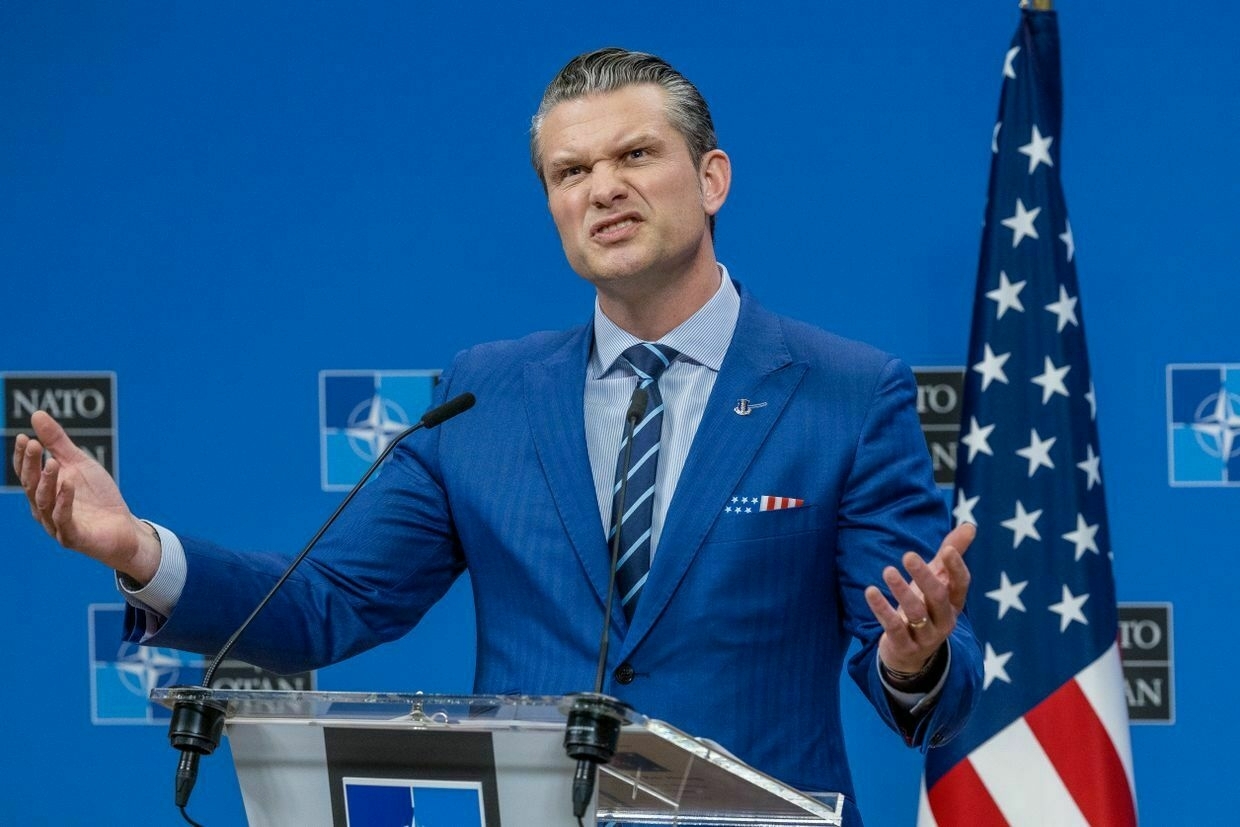
U.S. Defense Secretary Pete Hegseth unilaterally halted a weapons shipment to Ukraine on July 2 despite internal military assessments showing the aid would not compromise American military readiness, NBC News reported on July 4, citing three U.S. officials.
The pause in aid, which included critical air defense systems and ammunition, reportedly caught the State Department, members of Congress, Ukraine, and key European allies off guard.
Ukraine suffered one of the largest attacks on July 4, with President Volodymyr Zelensky calling for more air defense to protect civilians in the cities. The attack on Kyiv killed one person and injured 23 more.
A senior U.S. military review had concluded that while some munitions stockpiles, including precision weapons, were low, they had not fallen below critical thresholds, according to NBC. Despite this, Hegseth opted to stop the shipment. This is reportedly his third such move since February.
“We are not at any lower point, stockpile-wise, than we’ve been in the three-and-a-half years of the Ukraine conflict,” Congressman Adam Smith the top Democrat on the House Armed Services Committee, said. Smith, who said his staff reviewed the Pentagon’s figures, called the justification “disingenuous."
The shipment reportedly included dozens of Patriot interceptors, 155 mm artillery rounds, Hellfire missiles, guided missile systems (GMLRS), Stinger and AIM air-to-air missiles, and grenade launchers.
Two sources told NBC that some of the weapons had already been loaded onto trucks in Poland when the halt was ordered.
Zelensky recently called Patriot systems “real defenders of life,” since Patriot missile systems are the best air defense in Ukraine’s arsenal. They are considered to be the most effective measure against Russian ballistic missiles like Iskander and Kinzhal.
‘Major casualties among civilians’ — US freeze on air defense missiles is terrible news for UkraineThe halting of deliveries of air defense missiles from the U.S. will lead to“major casualties among civilians,” a deputy commander in Ukraine’s air defense told the Kyiv Independent. Politico reported on July 1 that the U.S. Defense Department (DOD) had halted shipments of some weapons previouslyThe Kyiv IndependentKollen Post
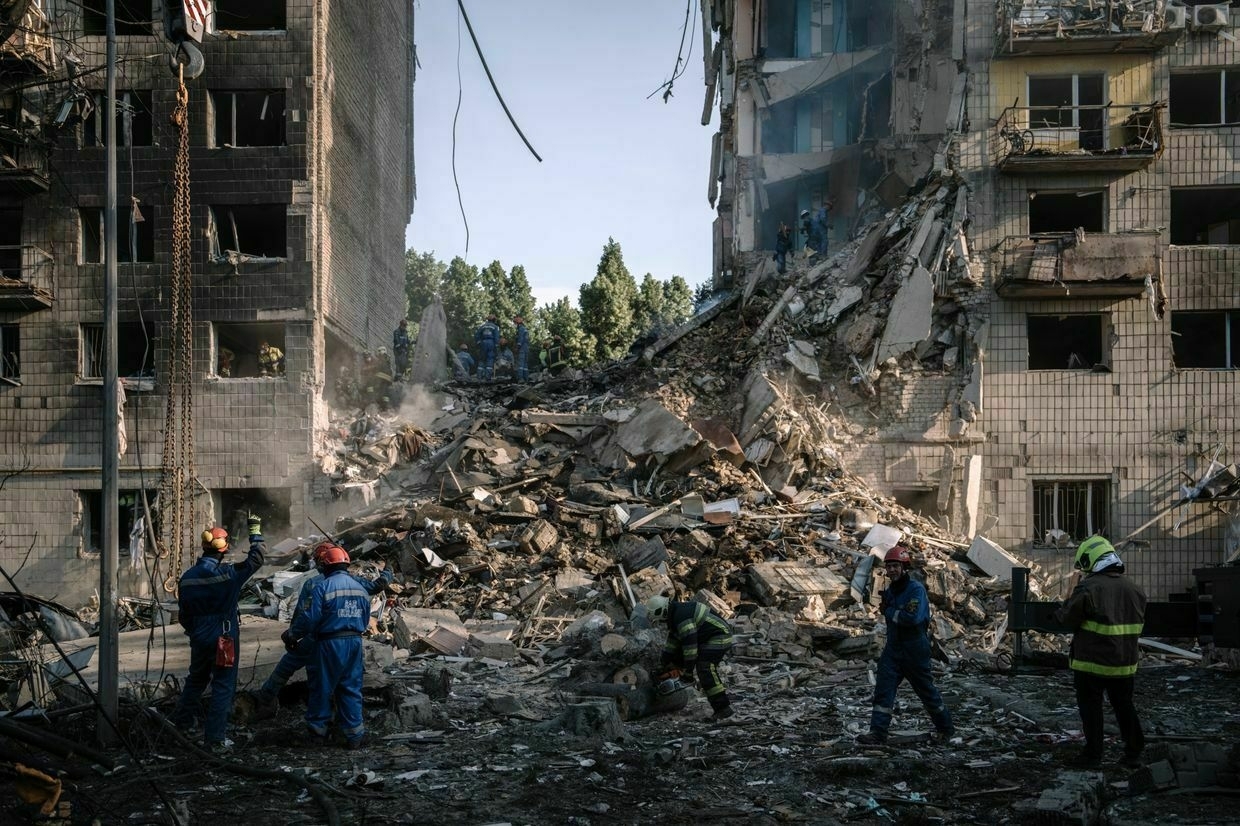
Pentagon spokesman Sean Parnell described earlier the decision as part of a broader “capability review” to ensure U.S. forces remain equipped.
The halt has initiated debate over the future of U.S. support for Ukraine.
Lawmakers from both parties, including Republican Congressman Michael McCaul, expressed frustration at the lack of advance notice. “Now is the time to show Putin we mean business,” McCaul wrote on X.
Republican Congressman Joe Wilson also reacted to the halt, warning of its consequences amid Russia’s ongoing strikes.
“As Americans begin to enjoy the sounds of fireworks in celebration of our Nation’s Independence, war criminal (Russian President Vladimir) Putin, who is losing his pathetic war, resorts to scorched earth tactics across Ukrainian cities that predate Moscow’s existence,” Wilson wrote.
Wilson said he is “confident the Department of Defense will advance President Trump’s objectives stated at The Hague to send additional air defense and approved weapons to help stop this absolute depravity, as allies have and must continue doing at a rapid pace."
Republican Congressman Brian Fitzpatrick has requested an emergency White House briefing, warning the decision could cost lives.
Trump has denied that the U.S. paused shipments on July 3, contradicting both Pentagon confirmation and reporting.
“We haven’t,” Trump told a reporter. “We’re giving weapons.” He also claimed the Biden administration had “emptied out our whole country” and insisted Washington must prioritize its own defense.
‘Nothing but terror and murder’ — Russia pounds Kyiv with record overnight drone, missile attack, 1 dead, 23 injuredFires broke out across the city as Russia attacked the capital overnight on July 4. At least 23 people have been injured, with 14 of the victims hospitalized. The Kyiv IndependentKateryna Hodunova
The Kyiv IndependentKateryna Hodunova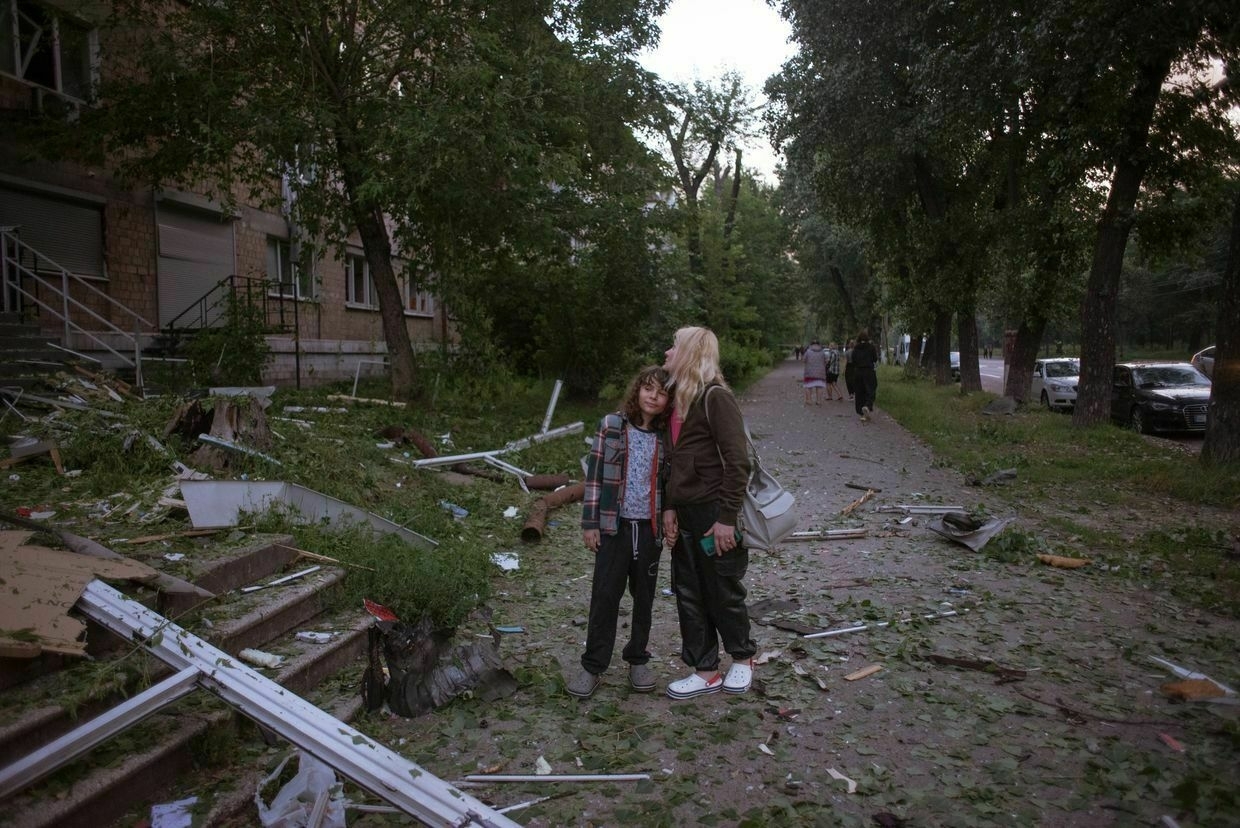
-
Russia intensifying use of chemical weapons in Ukraine, Dutch intelligence reports
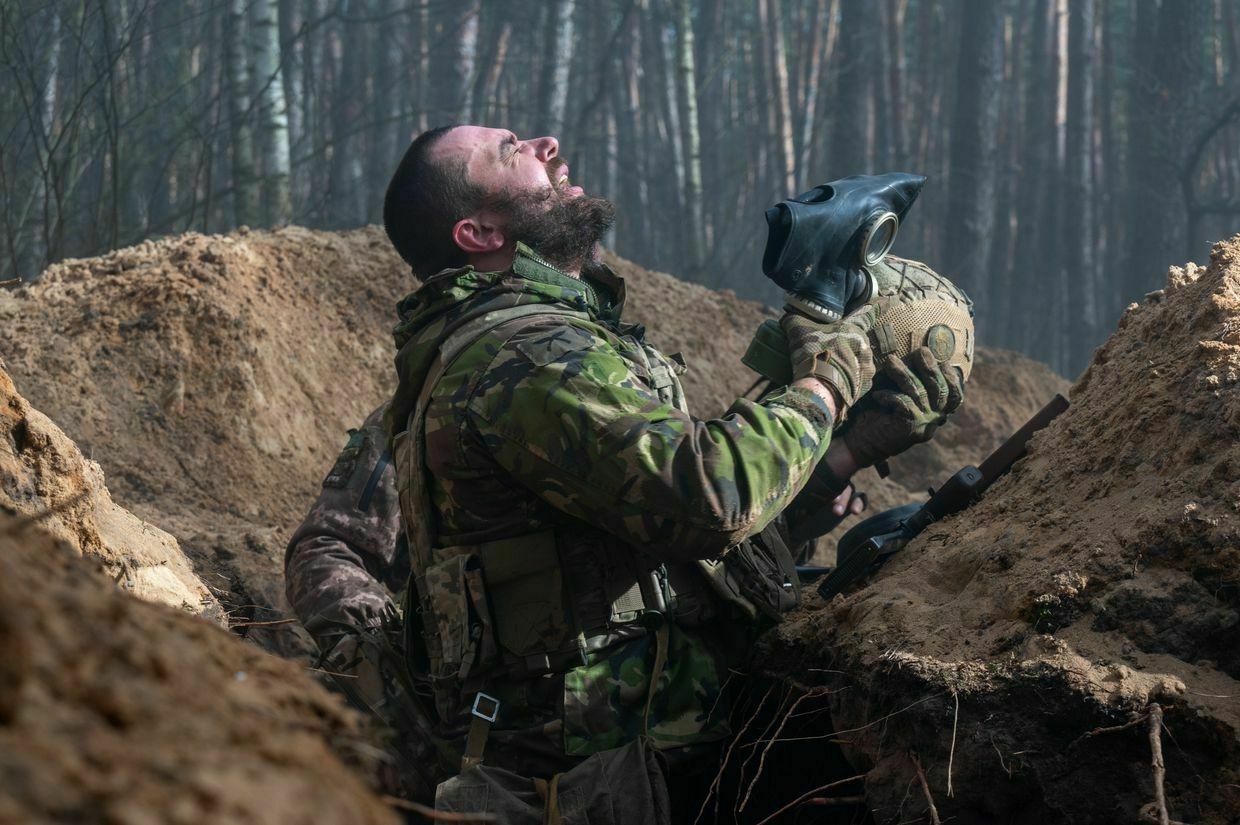
Russia is escalating the use of chemical weapons against Ukrainian forces, the Netherlands Military Intelligence (MIVD) reported on July 4.
Russian troops use banned chemical agents as psychological warfare to panic Ukrainian forces, forcing soldiers from dugouts and trenches with gas grenades dropped by drones, making them easy targets for subsequent drone or artillery attacks.
According to MIVD report, it was previously known that Russia usesd tear gas, but now intelligence has confirmed the use of chloropicrin — a substance that can kill in high concentrations in enclosed spaces.
Use of of chloropicrin, banned under international law, was discovered by the Netherlands Military Intelligence and Security Service (MIVD) and General Intelligence and Security Service (AIVD) together with the German foreign intelligence service BND.
The Kyiv Independent previously reported rising chemical attacks, but Ukraine could not accurately identify the chemical substances due to lack of equipment.
The U.S. State Department had already reported in May that Russian forces have used the chemical agent chloropicrin in Ukraine. The May 1 announcement was part of a larger statement about the introduction of new U.S. sanctions against more than 280 individuals and entities.
For now, the original statement has been removed from the U.S. State Department website.
Russia is using this type of weapon more frequently and “with ease,” says MIVD Director Vice Admiral Peter Reesink.
Dutch Defense Minister Ruben Brekelmans, who announced the news to the Dutch parliament, called the situation “absolutely unacceptable,” calling for “more sanctions, isolation of Russia and unwavering military support for Ukraine."
“We are making this public now because Russia’s use of chemical weapons must not become normalized,” Brekelmans said. “If the threshold for using this type of weapon is lowered, it is dangerous not only for Ukraine but also for the rest of Europe and the world."
Since the start of the full-scale invasion in 2022, Russia has conducted over 9,000 chemical attacks. At least three Ukrainian soldiers have died directly from exposure to toxic substances, according to Ukraine’s Ministry of Defense.
Dutch intelligence has established that Russian military leadership actively facilitates chemical attacks, and the use of banned substances has become standard practice for Russian forces.
Moscow is also increasing investments in chemical weapons programs, expanding research and recruiting new scientists, MIVD and AIVD observe.
The U.S. has accused Russia of deploying chloropicrin, often used in agriculture and widely weaponized as a “vomiting agent” during World War I.
‘Deliberately massive and cynical’ — Russian attack on Ukraine began as Trump and Putin spoke, Zelensky says“Patriots and their missiles are real defenders of life,” President Volodymyr Zelensky said. “It is very important to maintain the support of partners in ballistic missile defense.” The Kyiv IndependentAnna Fratsyvir
The Kyiv IndependentAnna Fratsyvir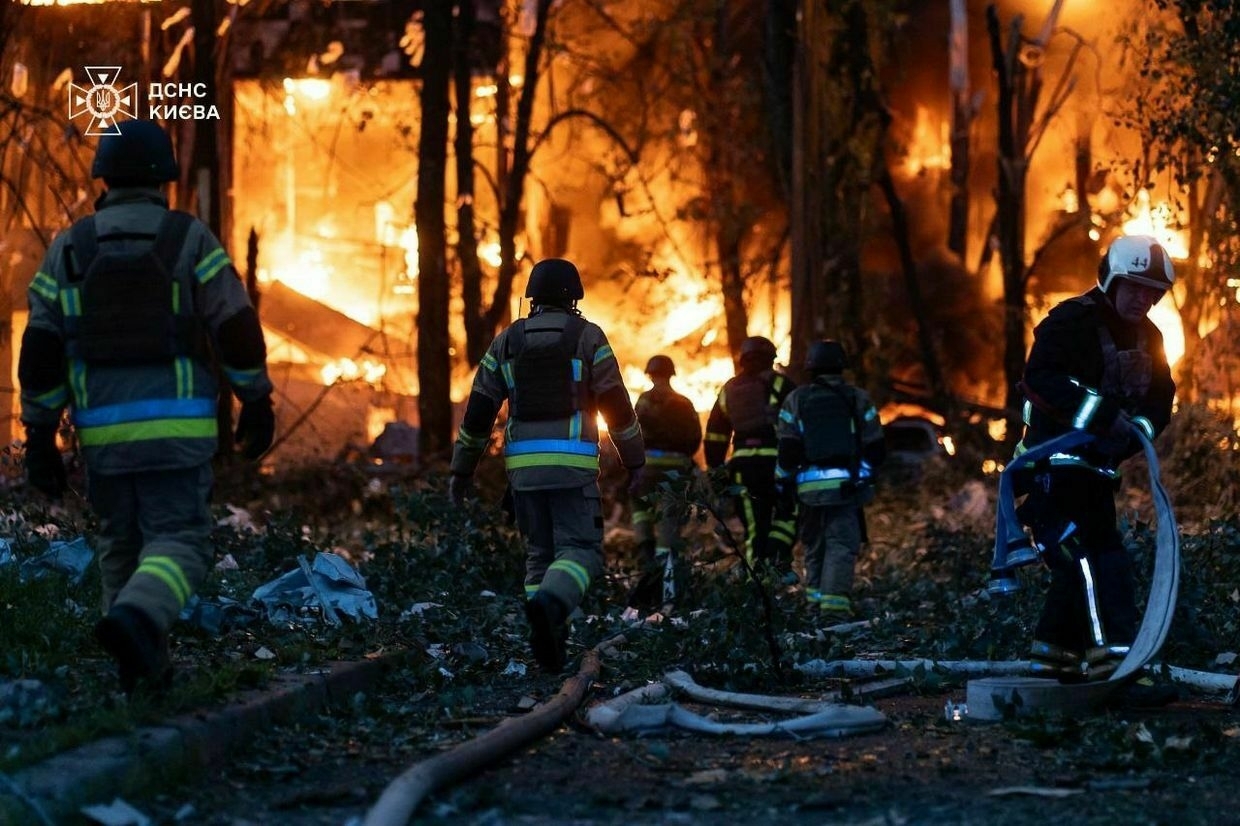
-
Trump envoy Steve Witkoff pushing to lift energy sanctions on Russia, Politico reports
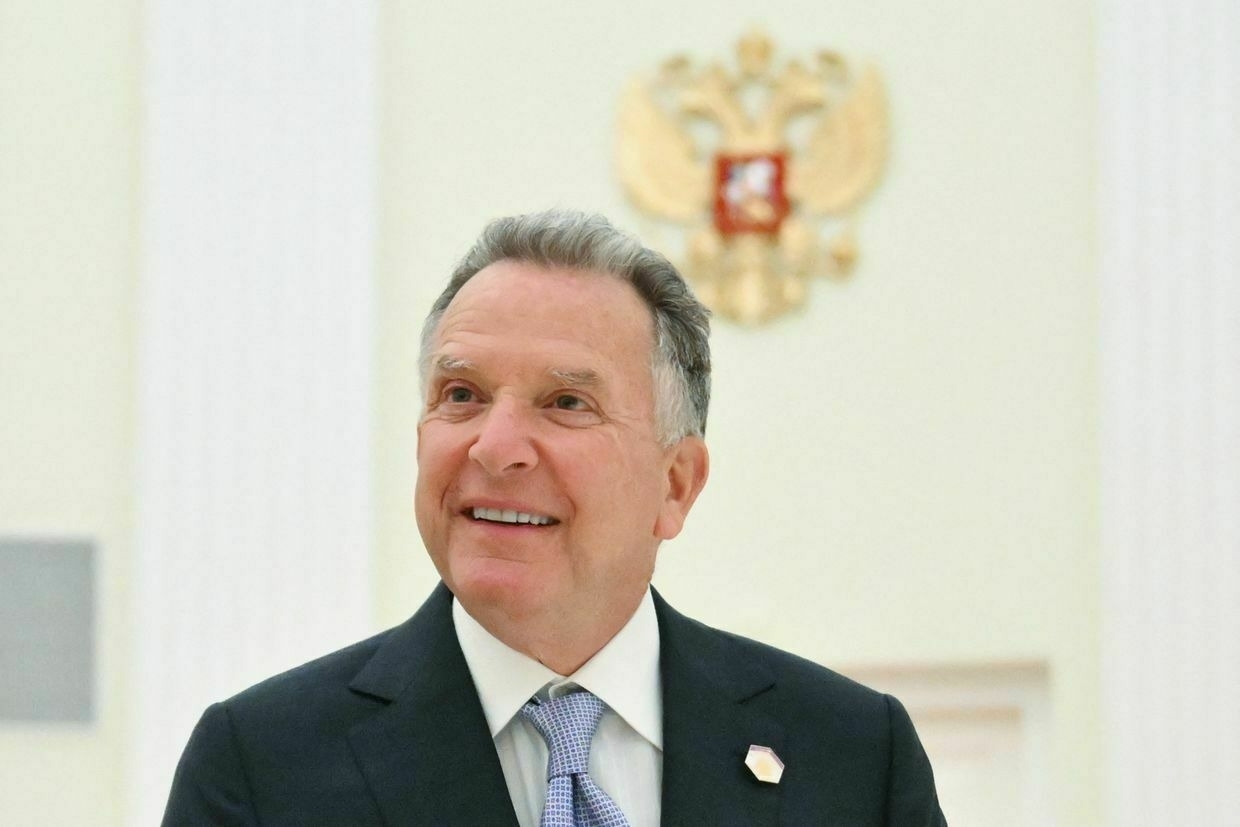
U.S. President Donald Trump’s Special Envoy Steve Witkoff is pushing to lift U.S. energy sanctions on Russia, Politico reported on July 4, citing two people familiar with the matter.
The move is part of a broader debate within Trump’s administration over how to engage with Moscow amid the ongoing war in Ukraine.
While Witkoff is reportedly advocating for the easing of energy sanctions, others in the administration disagree. Interior Secretary Doug Burgum favors reducing U.S. reliance on Russian imports rather than expanding trade, according to Politico.
Despite pledging during his campaign to end the war in Ukraine in “24 hours,” Trump has made little progress on securing a ceasefire. After nearly seven months of his presidency, and several peace talks between Russia, Ukraine, and the United States, no ceasefire agreement has been reached.
Moscow continues intensifying its attacks against Ukrainian cities. Russia launched one of the largest aerial attacks on Ukraine on July 4, hours after Russian President Vladimir Putin had a phone conversation with Trump.
When journalists asked if he had made any progress with Putin on the call, Trump responded: “No, I didn’t make any progress with him today at all."
Europe’s energy sector is a central issue in the debate. According to Politico, Moscow is in early talks with Washington about potentially restarting the Nord Stream pipeline project, with backing from U.S. investors. The development has sparked concern in Brussels.
One senior EU official reportedly warned that Trump and Putin appear to be aiming to “divide the European energy market and create (separate) spheres of influence."
Witkoff, a real estate developer-turned-envoy, has raised eyebrows in Washington and abroad over his handling of high-level talks with Russia. As reported by NBC News in May, he has relied on Kremlin-provided translators during multiple meetings with Putin, including a visit to Moscow on April 26, just a day after a Russian missile attack killed 12 people in Kyiv.
Trump’s administration has so far refrained from imposing new sanctions against Russia, even as Putin continues to reject calls for a ceasefire.
‘Nothing but terror and murder’ — Russia pounds Kyiv with ballistic missiles in massive overnight attackFires broke out across the city as Russia attacked the capital overnight on July 4. At least 23 people have been injured, with 14 of the victims hospitalized. The Kyiv IndependentThe Kyiv Independent news desk
The Kyiv IndependentThe Kyiv Independent news desk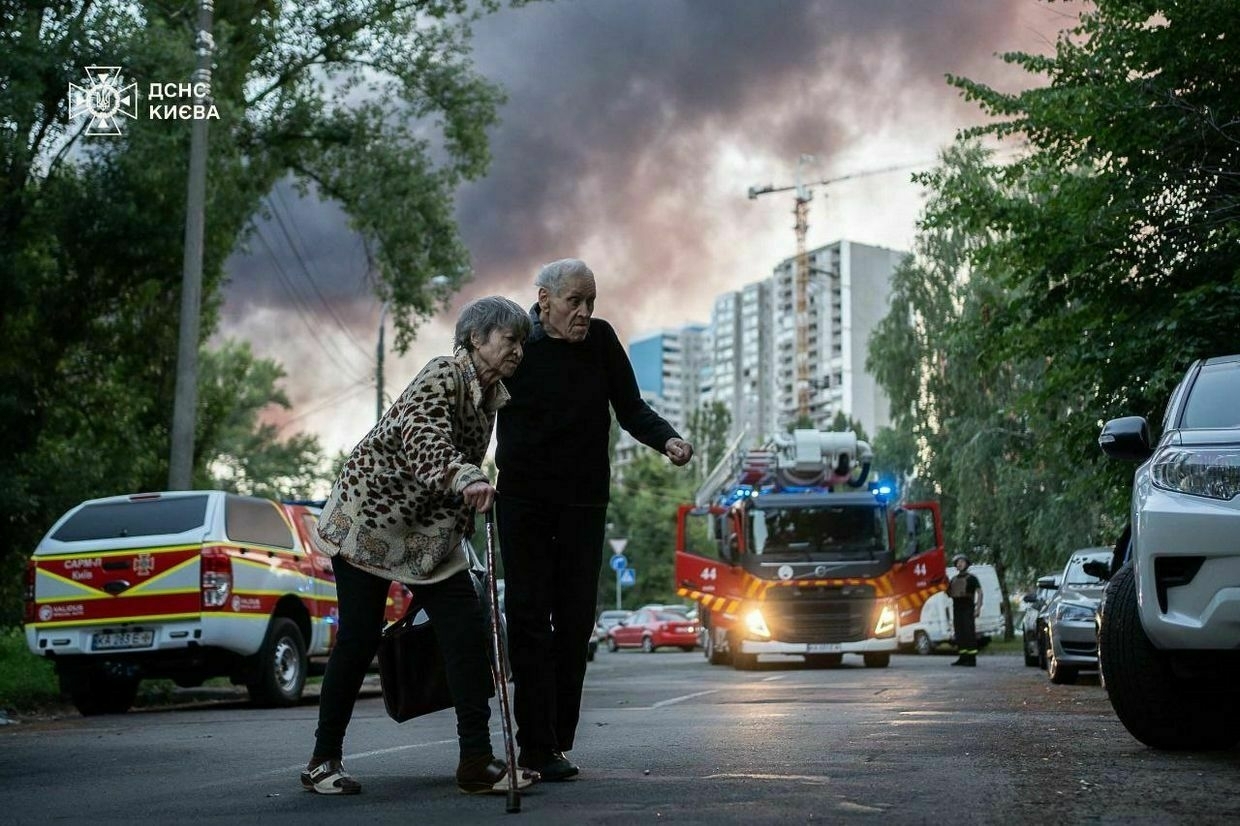
-
'I'm very disappointed' — Trump says after phone call with Putin
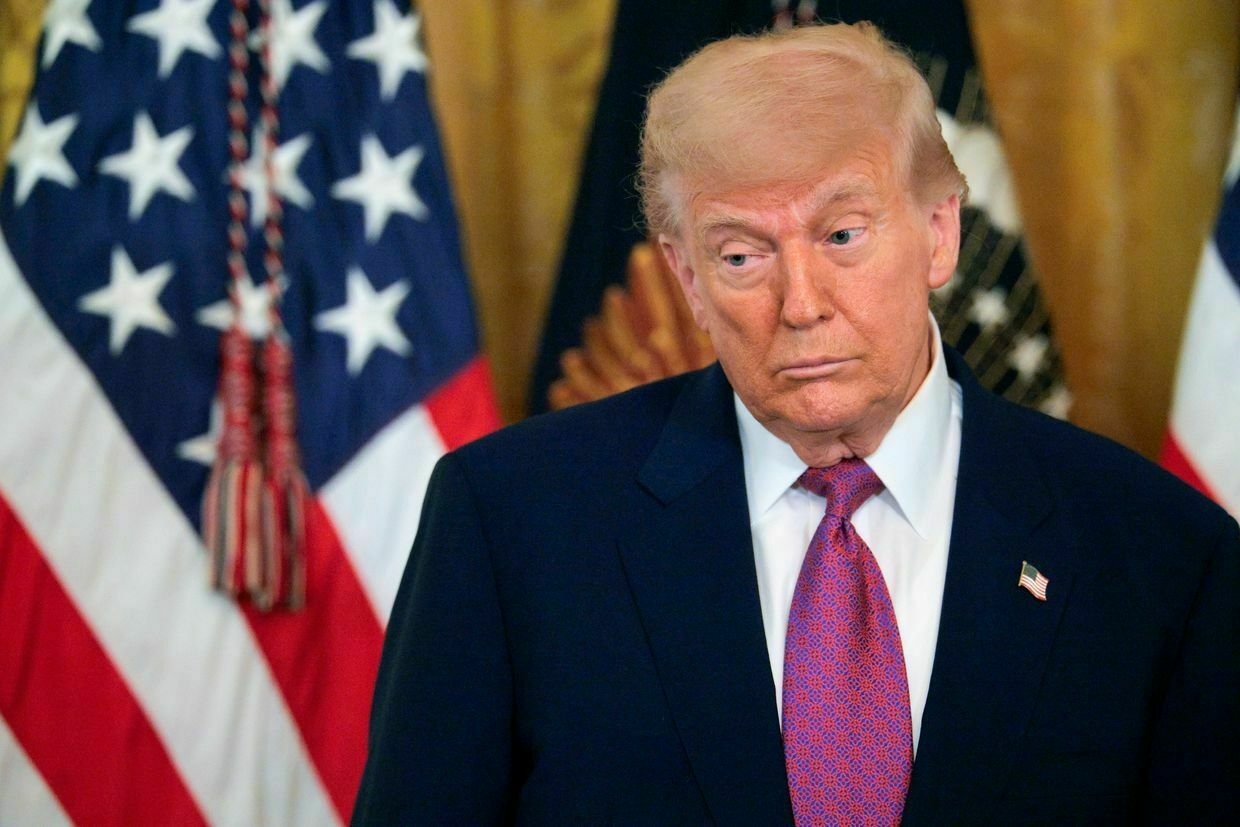
U.S. President Donald Trump said he was “very disappointed” with Russian President Vladimir Putin following a phone call on July 3, during which the two leaders discussed the ongoing war in Ukraine.
Trump told reporters he “didn’t make any progress” and accused Putin of showing no willingness to stop the fighting.
Trump also said that he is planning to talk to President Volodymyr Zelensky on July 4.
“I’m speaking to President Zelensky tomorrow in the early morning, and I’m very disappointed with the conversation I had today with President Putin,” Trump told journalists. “Because I don’t think he’s there. And I’m very disappointed. I don’t think he’s looking to stop this fighting."
The hour-long conversation between Trump and Putin marked the sixth time the two leaders have spoken since Trump took office in January. According to Kremlin aide Yury Ushakov, Putin reiterated that “Russia will continue to pursue its goals,” refusing to back down from what the Kremlin calls the “root causes” of the conflict.
The White House did not issue a readout of the call. Trump provided few additional details, only saying the discussion covered “a lot of things” and confirming no progress had been made on securing a ceasefire.
The call came just hours before one of the largest Russian aerial assaults on Ukraine in recent months. According to Zelensky, air raid sirens began sounding across Ukraine almost simultaneously with media reports about the Trump-Putin call.
“Russia is once again demonstrating that it is not going to end the war and terror,” Zelensky said. “The first air raids in our cities and regions began yesterday, almost simultaneously with the start of media discussions of President Trump’s phone call with Putin."
Overnight on July 4, Russian forces launched more than 550 aerial weapons, including over 330 Iranian-type Shahed drones and multiple types of missiles, across Ukraine, with Kyiv as the main target. At least 23 people were injured in the capital, where fires broke out in multiple districts and air pollution reached dangerous levels.
Zelensky renewed calls for increased military assistance from Ukraine’s partners, especially the delivery of U.S.-made Patriot missile systems.
“Patriots and their missiles are real defenders of life,” he said.
Despite Ukraine’s urgent appeals, the U.S. Defense Department has paused shipments of Patriot systems and other key munitions, citing the need to replenish domestic stockpiles. Ukrainian officials have warned that such delays threaten to embolden Russia and intensify attacks on civilians.
Putin tells Trump Russia won’t back down from its war aims in UkraineThe hour-long conversation between the two presidents focused on Russia’s war in Ukraine and the situation in the Middle East, according to Kremlin aide Yury Ushakov. The Kyiv IndependentTim Zadorozhnyy
The Kyiv IndependentTim Zadorozhnyy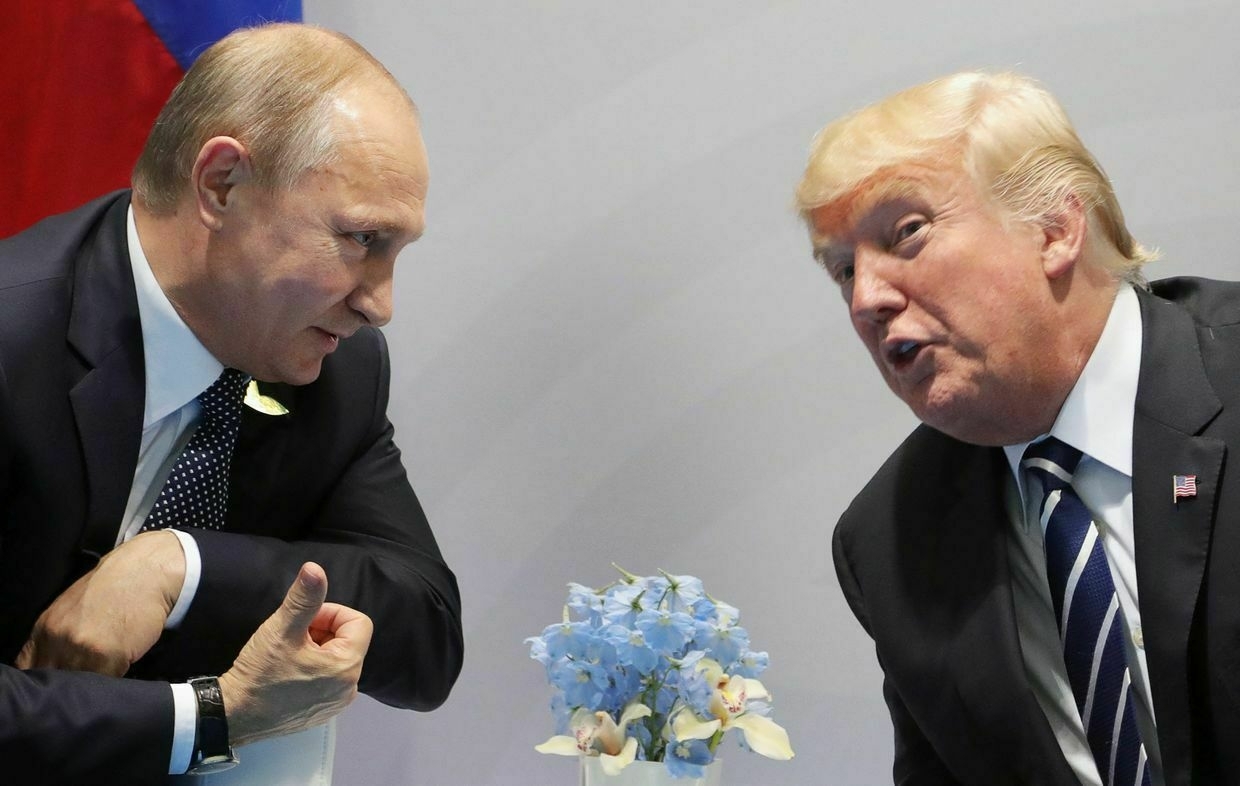
-
I DIDN'T make any PROGRESS with him – TRUMP on Putin's call #shorts

